#and also. no opinions any of the character profess reflect my own
Text
we, the psychos: masterpost
this fic is growing so fast it warrants its own masterpost now
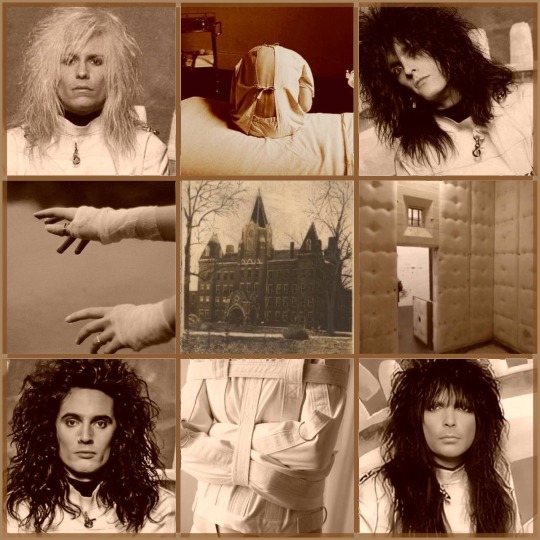
Fandom: Motley Crue, Guns n’ Roses (secondary), Kiss (secondary), the list may be updated
Summary:
The Feelgood Asylum, home to the sickest and the maddest, welcomes a new resident. That’s Tommy Lee, once a heir to a noble family, and now disowned and sent away for seeing what no one else sees and laughing when no one else laughs. At first horrified by the living conditions and the labor that patients have to perform, he then quickly finds new friends… and enemies.
Nikki Sixx, Frank Feranna for others, constantly loses battles with his own demons. And it’s not helping that the worst patient in the asylum, sex-addicted maniac Vince Wharton is sparing him too much - and at the same time not nearly enough - of his attention. And the new patient disturbs their already turbulent relationship even more.
And Mick Mars, who keeps quiet during the day and screams at night, never wanted any of this.
Warnings: mental illness (duh) and everything that it entails, self-harm, sexual assault, unethical medical treatment, period-accurate homophobia. The list may be updated
This fic was inspired by this post by amazing @smokeandmirrorz
Chapter 1
Chapter 2
Chapter 3
Chapter 4
Chapter 5
Chapter 6
Chapter 7
Chapter 8
Chapter 9
AO3
Last updated 21.05.2024
#we the psychos#asylum au#motley crue#motley crue fanfiction#nikki sixx#vince neil#mick mars#tommy lee#vinikki#before reading this fic i recommend you check out the post i linked. it will make their illnesses clear because i dont state them outright#and also. no opinions any of the character profess reflect my own
68 notes
·
View notes
Note
May I ask a clarifying question on your boundaries? I don’t consider myself “proship” or “anti” as I think those terms are reductive, and two people who may both fit under one label could have incredibly different opinions. However, I believe that the way I interact with media could be something that someone would call “anti”, in that I find it more interesting to look at fiction through the lens of reality rather than “fiction doesn’t effect reality”, by which I mean when reading Lolita I like to go “okay so what is this saying about how the psych profession saw csa at the time?” “How was this influenced by Nabokov’s own experiences?”, I see Marius and Armand as a reflection of child sexual abuse and enjoy analysing it under a more realistic lens, and would find wincest more interesting as a look at enmeshment between siblings under an abusive parent, rather than a ship (although what people mean by the term “ship” is also really vague and can differ wildly).
Based on that, and what you say in your pinned post, would you prefer I don’t interact? I wouldn’t want to make you uncomfortable!
Okay so to preface this, I don't go into much detail in my pinned because I hate the whole thing, and I hate spaces which are super dedicated to the pro/anti discourse. I try to keep my online spaces free of discourse and drama because its simply not fun! I don't want to spend my days steeping in negativity.
This got very long, so I'm gonna put it under a cut!
So. The thing is anon, the proship label originally came about as a response to antis, to describe people who don't actually care what other people ship ("ship and let ship", "your kink is not my kink and that's okay" and all that), but it's been massively conflated these days and now people take it to describe what they call problematic ships or art. You're right about them being reductive terms - and in fact, I have a lot of freak friends who are super into things I personally dislike or am outright squicked by (and vice versa), because we're not a monolith.
My stance entirely is this: I don't care what other people ship. I don't care how they ship it, or how they want to analyse and engage with that source material. I think what people ship and what art people enjoy has no say at all in what their morals might be.
What you describe as how you engage with those pairings is a completely valid interpretation! Preferring to look at a relationship through those lenses is perfectly fine, and in fact lots of people do this under the umbrella of meta.
What I personally mean by "ship" is the usual description - I want those two characters to have a romantic and sexual relationship. However, I also have no issues with people who don't have that viewpoint because it quite literally doesn't affect me unless they go about harassing others.
Liking a "problematic" ship dynamic doesn't mean you also condone that thing in real life. There's a reason one of the top sexual fantasies is noncon (see: any women's magazine list of these), and it's not because the person secretly really wants to be raped in real life. It's because human beings enjoy exploring taboo subjects in a safe and fictional environment.
Where my opinion stands on this is simple. If you think it's okay to harass people for the ships they like, if you think it's acceptable to write call out posts and smear people's names because of the ships they like, then I don't want to know you. If you think liking Marius/Armand makes that person a paedophile, or that liking underage ships leads to the person eventually moving on to real life kids, or that being an incest shipper means you're gonna go fuck your own sibling, again, I don't want to know you.
The same goes for both sides of this frankly stupid issue - far too many people who call themselves proship proudly love to dunk publicly on antis or people who don't share their viewpoints, which imo makes them just as bad! If someone's out there being awful to people who don't ship their problematic ships, then it's just as bad!
This is also why I don't do any DNIs or anything like that. If I see someone start to follow me and they have big obvious "PROSHIP DNI" in their info, then I will go ahead and block them, but otherwise I'm not interested in policing who can interact with me in that way. It's not for me to decide whether someone else wants to interact with me, it's on you to decide if you want to.
I'm not gonna be going out and ripping on people who dislike a ship I like, or who engage with art in a different way to me. However, if I come across posts in my tracked tags or on my dash expressing anti sentiments, or going on a negative rant about something I love, then I will also probably unfortunately be blocking that person. I don't like seeing negativity about shit I love on my dash or in the tags (really, does anybody? lol) so I'm proactive about that because a) it depresses me, and b) I spent a long time in the ffxiv fandom, where people think liking Garleans makes you a nazi apologist, and where they love to go on ranting screeds about how my favourite characters should die painfully, and I'm honestly not about that in my fandom life.
Anyway, all this to say: if you're comfortable interacting with me, a Marius/Armand bitch who does indeed enjoy their fucked up relationship because of how fucked up it is (and finds it incredibly sexy, actually), then I'm fine with you interacting with me. I'm not gonna be sharing or posting about that specific ship anyway, and I'm certainly not gonna be awful about people who find it distasteful or triggering or even just plain don't like it for whatever reason. It won't make me uncomfortable in any way to interact with you because you engage with those things in a different way to me, as long as you don't also engage in the other activities I discussed further up.
Sorry this got so long, anon! Hopefully it all makes sense. As an aside, I'm not interested in having any debates about these issues with anyone and will not be engaging with arguments about it. Sensible discussion, yes. Arguments, discourse and wank? No. Thank you for understanding! 💚
#ask quail#also as an aside: this is your free pass to unfollow and block me if my liking these things is a dealbreaker for you#this goes for anyone!#I have no issue with that at all#because at the end of the day we have to curate our own spaces#nonnybirds
7 notes
·
View notes
Text
I wrote a comment in r/SupermanAndLois awhile ago, where I mentioned how I’d one day get around to writing out an analysis on Jon’s character and his relationships. I have reposted that on my blog, but it’s largely irrelevant, except to say that I intended to.
The thing is, my original plan was to rewatch the previous two seasons, while taking some thorough notes on Jon’s personality and his relationships, and how those connections tie into his reactions and reflect his personality.
This never happened - despite starting my essay last year - because every time I tried going through a rewatch, I…got too upset.
It was one thing watching the first seasons, hoping for the last few episodes of season 2 - in the break after the ep. with the Barn Scene, wherein it seemed things were at last going to be addressed for Jon and begin to change for the better - to be what we hoped, in comparison with rewatching after…S2.
To sum it up: I couldn’t get through them.
Still, I did get somewhere with my analysis, and I’d like to hear any thoughts others may have in response. It’s really very little, when not posting my messy, unedited ramblings, but essentially: do you know Enneagram types? I’m actually not that familiar with it, aside from knowing things about my own. But when I was considering what and how to write the essay I’d mapped out, I thought a look at other personality analyses could be useful for kickstarting the process. So I went to the website. I remembered thinking of the profile and analysis on my type, how I’d been shocked at how accurate it all felt; which is why it’s what came to mind. I didn’t expect to actually find a type that fit Jon, but well.
Jon seems like a 3w2, in my opinion, and Jordan an 8, although I didn’t dive deep enough into the latter’s to determine wing.
Here’s the link to the Type Three profile. I’m not going to say I think every single line is spot-on for him, but I think it’s useful, still. Note: TW for ableist language in some parts.
Also: consider that some of the ‘unhealthy’ levels explained actually match Bizzaro!Jon.
There’s a lot to read and agree or disagree with, depending on how you, personally, interpret Jon’s characterization. For me, I found these excerpts quite striking:
[…] since these professions have status in their community and in the eyes of the family. No matter how success is defined, Threes will try to become somebody noteworthy in their family and their community. They will not be a “nobody.”
To this end, Threes learn to perform in ways that will garner them praise and positive attention. As children, they learned to recognize the activities that were valued by their parents or peers, and put their energies into excelling in those activities. Threes also learned how to cultivate and develop whatever about them is attractive or potentially impressive.
[…] Thus, the deeper problem is that their search for a way to be of value increasingly takes them further away from their own Essential Self with its core of real value. From their earliest years, as Threes become dependent on receiving attention from others and in pursuing the values that others reward, they gradually lose touch with themselves. Step by step, their own inner core, their “heart’s desire,” is left behind until they no longer recognize it.
Thus, while they are the primary type in the Feeling Center, Threes, interestingly, are not known as “feeling” people; rather, they are people of action and achievement. It is as if they “put their feelings in a box” so that they can get ahead with what they want to achieve. Threes have come to believe that emotions get in the way of their performance, so they substitute thinking and practical action for feelings.
Seriously, there’s a lot of Jon on that page.
8 notes
·
View notes
Text
ACTUALLY Hardcore Facts About Alexander Hamilton
Alright, take two.
I've already typed this entire thing out once, so this is likely going to be a lot more lazy than anything else I will ever post, so :).
Sources: Alexander Hamilton by Ron Chernow; John Laurens and the American Revolution by Gregory D. Massy; The Federalist by Alexander Hamilton; George Washington's Indispensible Men by Authur S. Lefkowitz; Lafayette by Harlow Giles Unger; Who Was Alexander Hamilton? by Pam Pollack and Meg Belviso
Hamilton wished for a war when he was like a baby. So if you know Hamilton, you know that one line where Hamilton says "As a kid of the Carribean, I wished for a war, I knew that I was poor, I knew it was the only way to rISE UP-" in Right Hand Man. Well, that line is based off of a letter Hamilton sent to his childhood bestie, Edward Stevens: "...Ned, my ambition is [so] prevalent that I... would willingly risk my life, tho' not my character, to exalt my station... I'm no philosopher, you see, and may be jus[t]ly said to build castles in the air... I shall conclude by saying I wish there was a war. Alex. Hamilton." Okay, dude, calm down, you're like two years old. I think he was actually like 14-16, but for dramatic purposes we'll say he was an actual infant (do I sound like Chernow?). But I hate how much this letter foreshadows. It's like he jinxed himself, its almost embarrassing.
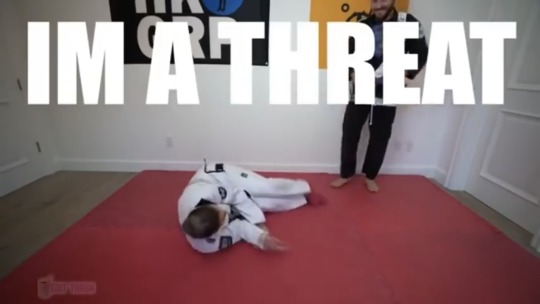
Hamilton ran a business at 14. Now if you've ever been fourteen and you were like "i think i feel like running a business" literally shut up no one asked. I think this is impressive. When Hamilton was at least 14, the guys the owned Beekman and Cruger (it had a different name by this time but this one sounds cooler) just dipped and left Hamilton in charge. This was actually a pretty good decision, since Hamilton managed it well. There was also this one time where Hamilton told a whole captain of a ship who didn't perform up to standard, "Reflect continually on the unfortunate voyage you have just made and endeavor to make up for the considerable loss therefrom accruing to your owners." This man was so arrogant I wish I had his confidence. Yeah that was cool ig, but if I met teenage-Hamilton, I'd literally hate him.

Hamilton saved the president of his college. Ever the dramatic, Hamilton had a thing for suppressing mobs (though he was pretty much never successful). There was this one time at King's College where a mob formed to "talk" with the president of the university, Dr. Myles Cooper (by "talk" i mean make him into a tory bird). And, according to Who Was Alexander Hamilton? (this book gives me so much joy), "Alexander vowed to protect him [aww]... He stood up to the crowd, telling them that violence would only hurt their cause. He couldn't stop the crowd, but he delayed them long enough for Dr. Myles Cooper to escape in his nightgown," (Pollack and Belviso 27-29). This is a really sweet description of it, but Hamilton was probably calling the mob a bunch of insults and stuff, judging by how he later handled riots. Also, Cooper thought Hamilton was rallying the mob, so he was a complete jerk to Hamilton, but rightfully. Everyone, bully Hamilton. He's short and dead like an idiot.

Hamilton was really cool on the battlefield, don't @ me. Now, despite being a clumsy little gremlin and an absolute dork, Hamilton was a pretty good leader, and I guess veterans deserve to be recognized for their victories or whatever. At the battle of Princeton, one of my favorites, Hamilton had very big, cool guns, and did some cool stuff. "Returning to the final phase of the battle of Princeton, British infantry took refuge inside Nassau Hall, the building that housed the College of New Jersey. American artillery commanded by Capt. Alexander Hamilton [ya boy] was brought to bear on the college building... Washington was on the scene and noticed this young artillery officer who skillfully commanded his gun battery. The general would soon invite Hamilton to become one of his aides-de-camp," (Lefkowitz 92). Wow so cool moving on to Yorktown.
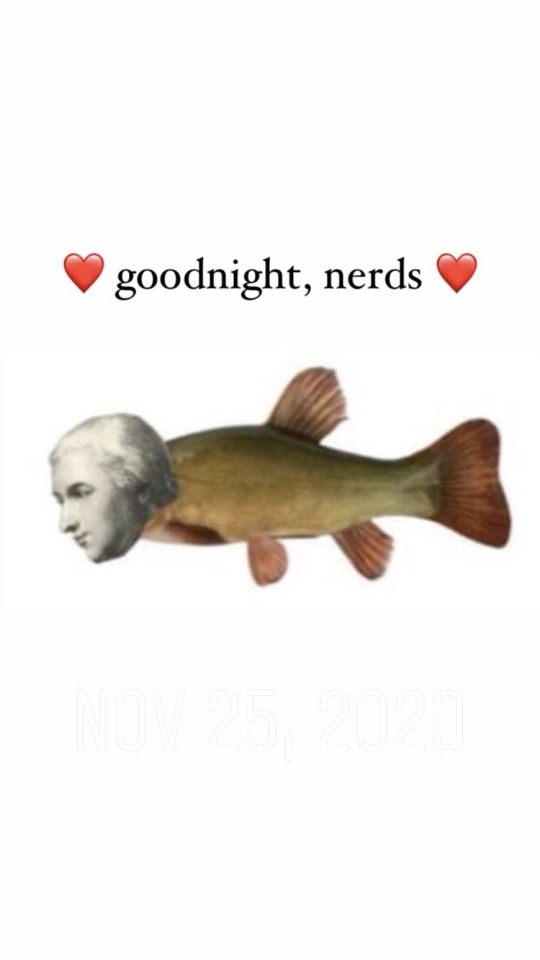
When the Americans were building their fortifications, two British fortifications were in the way. So rude. Consequently, Washington sent The Gay Trio, Lafayette, Laurens, and Hamilton, to uh, silence them. Hamilton pulled off a successful sneak attack, and won the battle swiftly, leading to the American victory in the battle of Yorktown, and therefore the war. "...Colonel Hamilton['s] well known talents and gallantry were on this occasion most conspicuous and serviceable. Our obligations to him, to Colonel Gimat [stan], to Colonel Laurens, and to each and all the officers are above expression..." -Major General Marquis de Lafayette. Lafayette is so nice I would marry him if he was alive and single and legal and not old as hell. Like omg he gave credit to everyone but himself that's so nice I'm such a simp for Lafayette. Anyway, Hamilton was cool too ig.
Hamilton caused the evacuation of Philadelphia like an iDIOT. So, after Brandywine (British victory), Washington sent Hamilton on a foraging mission in Vally Forge to get flour, horseshoes, and tomahawks (not quite as exciting as Yorktown). Well, our clumsy ginger rat got caught, and wrote to the president of Congress, John Hancock, "If Congress have not yet left Philadelphia, they ought to do it immediately without fail, for the enemy have the means of throwing a party [party rockers in the house tonight] this night into the city. I have just now crossed the valley-ford [Valley Forge], in doing which a party of the enemy came down & fired upon us."
Surprise, this turned out not to be the entire goddamn British army, it was just a few scouts sooo... let's just say Philadelphia wasn't happy. "Our Removal from Philad. Was owning to information that General Howe was crossing Schuylkill [River]... However tho' this Intelligence was from one of the General's family (Alexander Hamilton) it was not well founded & we wish we had not left Philad.," -James Duane. Yeeeaaahhh, that's awkward. Not the best way to get your name known in the capital, I must say.

Hamilton was possibly bisexual, and this is hardcore because I say so. Now, I'll add more quotes to this later, but basically heres my interpretation of the historical evidence and whatnot. Basically, Hamilton was a really closed off, cynical guy, since like everyone he ever loved died or left him pretty much, and he wasn't really the type to make and keep close friends; "...how little dependence is to be placed on treaties, which have no other sanction than the obligations of good faith, and which oppose general considerations of peace and justice to the impulse of any immediate interest or passion," (Federalist 64); It is a known fact in human nature, that its affections are commonly weak in proportion to the distance or diffusiveness of the object," (Federalist 73). Um, Mr. Hamilton? You're projecting your trauma on the government again.
Also, despite working with him for like twenty years, Hamilton really never got close to Washington, like at all. He even said to Laurens, "I have no friendship for him and have professed none," in regards to Washington, which is kind of mean. But he ALSO told Laurens:
"Cold in my professions, warm in my friendships, I wish, my dear Laurens, it m[ight] be in my power by action rather than words [to] convince you that I love you. I shall only tell you that till you bade us adieu, I hardly knew the value you had taught my heart to set upon you. Indeed, my friend, it was not well done. You know the opinion I entertain of mankind and how much it is my desire to preserve myself free from particular attachments and to keep my happiness independent of the caprice of others. You s[hould] not have taken advantage of my sensibility to ste[al] into my affections without my consent."
*mocking Hamilton* its YOUR fault that i love you and it was RUDE that you FORCED me to love you how DARE you you SUCK i love you uwu.
Also, at the top of that letter, someone mysterious (probably Hamilton's son) wrote, "I must not publish the whole of this," and Massey still thinks Hamilton was straight.
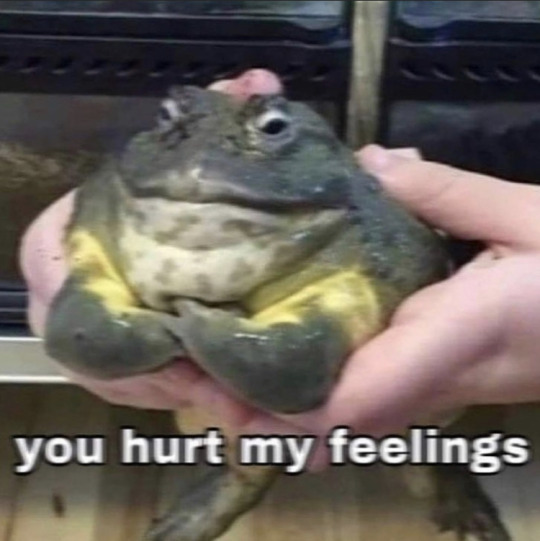
But yeah, that's about it. I had originally written more at the beginning, but I unfortunately lost the original draft, so I'll just settle for this. I hope you enjoyed, though, and maybe learned something or found a quote you needed or something. I did more research than I wanted to in one sitting for this, so appreciate it or I'll cry. Thanks love you <3
#alexander hamilton#hamilton#hamilton the musical#hamilton the movie#lin manuel miranda#ron chernow#aaron burr#weird history#george washington#amrev#amrev history#american history#american colonies#american revolution#the american revolution#the american war of independence#colonial america#stupid clumsy ginger gremlin#dorkface loser baby man#stupid litte idiot i hate him#he had his moments tho#this post hurt me financially#need a national bank now ig :/
90 notes
·
View notes
Text
On The Style and Effectiveness of 1-A Hero Costumes - Part 2/5
Part 2 of this post!
NAVIGATION
Part 1 2 3 4 5
INGENIUM / IIDA TENYA
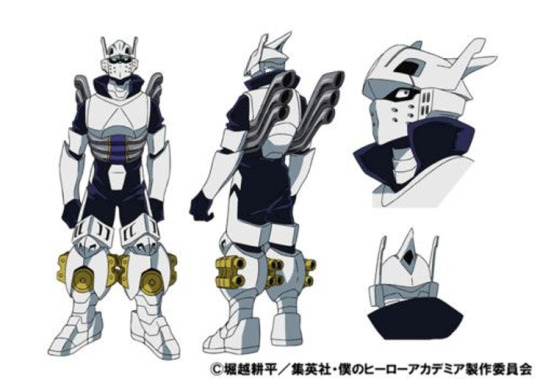
It’s armor time!!! Behold a man.
What I don’t like:
The costume seems too bulky for a Quirk and fighting style that optimize speed. And while it’s true that cars are pretty bulky but still go fast, it’s equally true that certain types of cars are designed to go faster. The current design reminds me most of a semi or a big SUV, but if the costume was more streamlined along the lines of racecars or sports cars, it would help take off the extra weight that the bulk provides, leaving Iida lighter and more streamlined - therefore, faster.
Some examples of slimmer armor include Go Go Tomago’s from Big Hero 6 and Jim Lake Jr.’s from Trollhunters. And while I get that his body type inherently lends itself to being tank-like, lightening up on the bulk would probably be great for him.
The exhaust pipes out of his back confuse me. They bring some car energy, which is entirely welcome, but they likely hinder balance and motion, which is bad. They leave him looking a little unbalanced, and since so much of his strength and his fighting ability focuses on his lower body, having excess superficial material protruding out of the sides like that doesn’t seem to lend him any favors. And even while it looks cool, it just seems like it would be uncomfortable? Especially since a lot of runners - Iida included - like having full range of their arms to help propel them forward. The pipes might get in the way of that.
Here’s what I like:
The overall aesthetic. I love how this look both makes sense with Iida’s Quirk and personality and plays with elements of his older brother’s costume. It simultaneously puts across some knightly vibes - which is genius, considering how chivalrous and rule-following Iida typically is - and also calls to mind Transformers and cars with the emphasis on the engines and some of the more mecha elements.
The support! Armor is such an easy way to protect yourself while also getting some serious style points. His most essential areas are covered - neck, chest, arms, and legs - which is especially important considering that Iida’s legs are integral to his Quirk and his fighting style. The helmet is also a really good choice, considering this boy is essentially a human car. He looks a bit intimidating wearing it, which is good for fighting Villains, I suppose. Class dad is protected.
And a misc. note:
You know how after Iida’s special Recipro Burst move, he has to wait awhile while his engines cool back down? I think it would be really neat if he implemented some cooling technology into his Hero suit (similarly to Todoroki’s temperature-regulating gear). Theoretically, if he could find something that worked a bit like coolant for his engines, he would have a much quicker reaction time - and speed is the main facet of his Quirk, so it would probably help a lot!
Overall: Very good at providing protection while having a bomb-ass aesthetic. Not quite so good at being built for speed.
I CANNOT STOP TWINKLING / AOYAMA YUUGA

On the other side of the armored spectrum… we have this kid!
What I don’t like:
*Edna Mode voice* NO CAPE! Why do I not like the cape? Capes can snag on stuff very easily and it would be an easy thing for Villains to target and use to unbalance Aoyama. Longer capes are especially susceptible to getting trapped under rubble, torn up, or covered in gunk from the environment (which is not the Look he seems to like). I feel like a shorter cape would get a similar message across while minimizing the potential dangers that a long cape poses. Of course, Aoyama can be trained via experience to utilize his costume effectively with the full-length cape, but when his life and the lives of others are on the line, I’d rather not take that chance.
The shades. I get that they’re iconic, but they’re taking rose colored glasses a bit too seriously. 110% will fall off his face and also messes with the princely Vibe the rest of his costume provides. I do like their Elton John energy, though.
Not a bad thing, but I just want to know how his belt works.
Here’s what I like:
The overall aesthetic. I love how the costume’s obvious “princely knight” vibe reflects so much of Aoyama’s character.
The support here is also really good! Working the belt into the theme of his costume so seamlessly is very innovative and I love that for him. Getting the knee pads and shoulder pauldrons to match his central laser both adds to the uniqueness of the outfit and also pushes that royalty theme since they look very similar to inset gems.
The color scheme. Purple, silver, gold, and black look very classy and regal together, and I appreciate how the royal purple ties back into the concept of European royalty, which is very in-character for this boy. His pantaloon-looking things??? Neato.
Overall: Eh, okay. Ditch the glasses and shorten the cape. Superb, you funky lil knight light.
CREATI / YAOYOROZU MOMO

Here we are! I’m finally taking a crack at one of the most highly debated hero costumes in the entire show, and like a good portion of people, I’m gonna be extremely salty about it. Yaomomo doesn’t deserve this - none of the girls deserve this. These are my thoughts:
What I don’t like:
The absolute lack of support. For any aspect of her. Nothing about this costume is protective (other than maybe the partial high collar). Her most vulnerable areas are exposed, and while it makes sense for easy Quirk usage, it does not make sense for a girl who’s fighting homicidal maniacs on the front lines. The most glaring area in need of support is obviously her chest, as nothing substantial is holding her bust in place. However, so much could be done to work with the benefits of Creation and against its weaknesses that is not being done in this costume. I’ve seen quite a few redesigns that include a sports bra with a front zip closure, which is worlds better. With the show being set in the future, having a slightly mechanized costume with the ability to retract certain pieces at the press of a button would be useful and likely doable considering Yuuei’s own Support department. Gloves would probably be a good idea to give Yaoyorozu a better grip on harder-to-handle Created objects, such as heavy metal machinery.
The over-sexualization is, obviously, disgusting. Nothing about this costume says “Hero.” What it does say, in-universe, is that someone had the absolute gall to approve and send this outfit to a 15-year-old girl about to be thrown headfirst into training for an extremely dangerous profession. It says that giving a person in their freshman year of high school an overly sexualized outfit meant for combat training is okay (it isn’t, for reasons I can’t even begin to explain). This more closely resembles an outfit for a lingerie or swimsuit model than it does for any type of superhero, which alone should be enough to warrant some serious changes - especially, as I have stated, since the girl is only 15!
The overall aesthetic. There is no aesthetic reading for this costume other than “sexy”, which, as I explained above, is very problematic. Sure, the exposed skin makes sense for her Quirk, since she needs access to skin in order to produce items with Creation, but nothing about this outfit denotes anything about her personality. Yaoyorozu Momo is a gentle girl who has been shown to have self-esteem issues from early on in the show, and just knowing that makes me wonder if she feels uncomfortable wearing this. If she’s totally comfortable in this look, good for her! But comfort in our clothing factors so much into our mental states, which translates directly to our physical performance - it’s the same reason why having clothes that fit you and your style well make you feel more confident and more content. And especially if Yaoyorozu wasn’t quite expecting the amount of skin revealed when her costume was given to her, it could likely have added on to her self-esteem issues as seen early in the school year.
The skintight fit of what amounts to a glorified bathing suit is not conducive or acceptable whatsoever. With such a powerful Quirk, Yaoyorozu needs all the protective material she can get - which, as I said in Uraraka’s analysis, is quite simply not possible to fit under that bodycon fabric. Some padding at the very least would work wonders, and bulletproof material would serve her even better.
Once again, heels are not good for any kind of running or fighting! At least it’s a block heel, which is marginally more stable than, say, a stiletto, but still.
The literal bookshelf on her ass. It makes no sense to put it there - it’s an inconvenient place (what if she needs to sit down?) and it looks incredibly awkward to move around with. Besides, there’s absolutely nothing stopping that book from falling at the slightest jostle. At least give her a proper holster or implement it into a toolbelt like some of the boys have.
What’s with the belt? Can it hold emergency supplies? Or is it just there to make it seem like she’s wearing more than a deep v one-piece? I’m at a loss here.
Here’s what I like:
The color scheme. Deep red, white, and pale yellow look good on her! The color ratios are also pretty good in my opinion. Unfortunately, this is the only good thing I can say about her getup.
And to round us out, some misc. notes:
I feel like the book could be done away with entirely and replaced with something digital. This universe is set multiple centuries into the future, and I think something like a holographic data set would look slick, enable for faster search time for whatever info Yaoyorozu would need, and eliminate the bulk problem completely. At the very least, there could be a smartwatch-type gauntlet to pull up info with a larger screen to enable easy reading. Really, the lack of support for Yaoyorozu’s look is devastating because she could go so many directions in creating an outfit that works with her Quirk’s strengths and against its weaknesses.
Overall: Awful, a disgrace, and a disservice to one of the coolest, kindest characters in the class. I would kill for her to get the outfit she deserves.
INVISIBLE GIRL / HAGAKURE TOORU
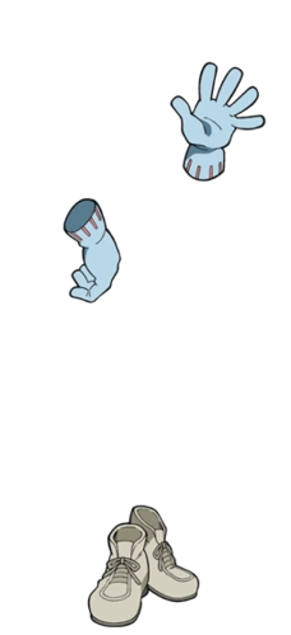
Wow, look! Two travesties in a row! One more and I get a bingo!
Hagakure, I love you so much, and I am so, so sorry that the yahoos over at the Support company thought that this was a good idea.
What I don’t like:
Uh. The fact that there isn’t a costume. There is literally no in-universe rationalization for this. Surely, they have the technology. Just look at Lemillion! Togata Mirio’s Quirk is literally phasing through materials (including his own clothing) and they made him his own non-phaseable costume by weaving his own DNA into the fabric! Even if they don’t have the technology (they do), I know that Hatsume and probably the rest of the Support students would immediately jump on the chance of creating a fabric with the ability to switch between visible and invisible modes.
Once again, the sexualization of minor Hero students continues to disturb me. Who in their right mind thinks it’s okay to send a naked teenager out into a live battlefield just because she’s less likely to be noticed that way? This line of thought surely doesn’t account for stray bullets or falling debris, nor does it account for this poor girl’s peace of mind. She should be focused on getting the job done and saving people, not worrying about how it’s too cold for her to work properly or how there’s nothing between her body and a loaded gun except for the air between them.
The gloves and shoes seem like they’re kinda. Missing the point of contributing to a stealth Hero costume? Yes, they’re good so that Hagakure can be easily recognized among her allies, but does she just have to stow them wherever when she needs to go fully invisible and hope she can find them once the mission’s over? Plus, Hagakure will always, at the very bare minimum, need something to protect the soles of her feet. Walking barefoot just for everyday civilian stuff would cause a lot of problems, but Heroes likely have a lot of broken glass, broken nails, debris, and other nasty things on the streets where they fight. Tetanus is not fun to have.
Here’s what I like:
The gloves are a nice color, I guess?
Some misc. notes:
I gotta say, I’ve seen SO many good takes on outfit redesigns for Hagakure (same with Yaoyorozu) and the fandom collectively has some wonderful ideas on how to go about creating a costume for her. Personally, I think it would be cool if she had a full-body suit that could change between visible and invisible modes - that way, she would be easy to identify in head counts and it would likely be easier to see places where she could be injured after a fight. At the very, very least they could pull a Lemillion and have her outfit infused with something from her own DNA so it can disappear as she does while leaving her at least covered.
Overall: So, so bad. Please give this girl a suit. I’m tired.
TLDR Part 2:
Great Costumes:
Good: Iida
Okay: Aoyama
Questionable:
Bad:
The Absolute Worst: Yaoyorozu, Hagakure
#happi rambles#anime#bnha#walk walk fashion baby#meta#iida tenya#aoyama yuuga#yaoyorozu momo#hagakure tooru#and here's part two!#as I said earlier I'll link everything together once all parts are posted and I'm sorry if I didn't catch some spelling/grammar errors#long post#class 1A costume analysis
35 notes
·
View notes
Text
“Daughters’ skirmishes with mothers cut close to the bone, working the borders of identity often blurred by shared location within the home. With their responsibility for the reproduction of domestic roles, mothers lay centrally in the line of command over the lives of their daughters. Of course their authority was shared power—power that originated with wages earned by husbands and fathers.
Traditional patriarchy had been in decline for some time in the late nineteenth century. Without land to disperse, fathers had been losing their authority over their sons’ destinies, and as they moved to cities and took up work outside of the home, fathers were less and less involved in the delegation of work within the home. But in fundamental and important ways, they still ruled.
Those responsible for advising girls on their role in life reminded them of their continuing need to curry favor with fathers —and with reason. The Victorian patriarch could appear unexpectedly, thwarting plans, making pronouncements, breathing moral fire. Yet he was not always successful in these less and less common rulings. When opinion at home had congealed elsewhere—particularly when mothers and daughters agreed—the Victorian patriarch could find his authority hollow. Especially as daughters matured from childhood and found their lives inscribed with the expectations of gender, fathers receded from the line of command, expecting of their daughters, as they did of their wives, not obedience but domestic ministration.
Fathers’ familial responsibility for daughters translated into responsibility for guidance in two particular arenas beyond the walls of the home. Men were responsible for supervising their daughters’ academic education and for assisting them in their studies in religion. This responsibility is well communicated in the kinds of gifts bestowed by fathers on daughters on birthdays—prayer books, writing books, pens, dictionaries, atlases, library subscriptions. Fathers’ responsibilities for higher duties were reflected in their stern communications with daughters at midcentury. Agnes Lee received letters re- inforcing the importance of studies from her father, Robert E. Lee, in the 1850s when she was away at a female seminary.
He took issue with a bit of exuberant homesickness: ‘‘I must take you to task for some expressions in your letter. You say, ‘our only thought, our only talk, is entirely about our going home.’ How can you reconcile that with the object of your sojourn at Staunton! Unless your thoughts are sometimes devoted to your studies, I do not see the use of your being there.’’ It was often fathers to whom daughters recited lessons, and whose words of commendation were particularly meaningful. Fathers’ responsibilities for their daughters’ educations represented a vestigial authority for a family’s competency in the world—and continued when responsibility for other aspects of daughters’ lives had receded.
The same was true, though to a lesser degree, for fathers’ responsibilities for daughters’ souls. Kathryn Kish Sklar has written powerfully about the intertwining strands of patriarchy and evangelical culture which bedeviled Catharine Beecher’s quest for a conversion experience early in the nineteenth century. As mothers took up their newly won roles as moral exemplars, they supplemented but did not replace fathers as the guardians of familial faith. Robert E. Lee encouraged his daughter’s relationship with God as well as her studies, and his daughter wrote back a shy profession of faith, offered to her father as to one to whom it was owed: ‘‘I have something to tell you which I know will make you very happy. It is, I believe both of your daughters are Christians. I am sure Annie is, and O Papa I am resolved to doubt no longer that there has been a great and blessed change wrought in my wicked heart.’’
Though absent from the day-to-day dealings of the household, fathers’ interest in the state of their offsprings’ souls extended to the their moral training as well. Margaret Tileston’s diary, which included financial accounts, also included a moral accounting with her father. ‘‘I told Papa of a lie I told him about a week ago, last Tuesday or Wednesday.’’ It was in such a grave consciousness of his paternal responsibility for the character of his daughter that Albert Browne wrote a long letter to his daughter Nellie as she was preparing to leave school, ending with the admonishment that ‘‘a true christian woman, should make it a religious duty, to blend gentleness and dignity, as to win love, and command respect.’’ Albert Browne had no doubt of his authority over his daughters’ transition to womanhood, just as over other family matters.
…The conservative Ladies’ Home Journal in 1895 attempted to re- affirm masculine authority in what must be seen as a reactionary challenge to feminized domesticity. In reasserting ‘‘The Father’s Domestic Headship,’’ the Reverend Charles H. Parkhurst, D.D., acknowledged a ‘‘great deal of domestic reciprocity’’ but pronounced that ‘‘the husband and father is the point of final determination.’’ He sought an analogy for the moral authority of hus- band and wife in anatomy: ‘‘The bone and sinew of character will probably be a quotation from the father, and the delicate tissue with which it is over- laid will as likely be a bequest from the mother.’’ This late-century contrast between the strong force of paternal dictum with the more diffuse ‘‘tissue’’ of the maternal presence acknowledged a long-standing reality—that absent fathers would need to make their authority felt concisely in worded dictates, rather than through the steady example of a more present maternity.
By 1895, however, when Parkhurst was writing, he was in many ways too late. His assertion of masculine hegemony in the household was regressive— and claimed an authority for fathers in their daughters’ lives that they could not count on. Those girls in the postwar years most likely to reveal their dependency on paternal dictates—for instance, the reformer Jane Addams growing up in the late 1860s and Mary Thomas away at school in Georgia in the 1870s—used their fathers as live models of correct conduct with good reason, for both their mothers were dead. If daughters empowered by the increasing moral authority of their mothers were beginning to feel free to challenge paternal prerogative, fathers themselves showed, over the nineteenth century, a diminishing sense of identification with their daughters.
Fathers like Robert E. Lee and Albert Browne took seriously their paternal responsibility for providing guidance to their maturing daughters, but that guidance often required setting a new form of reference—the inscribing of gender on girls defined previously by their status as children. Albert Browne’s advice to Nellie intended to prepare her for that new station. He reminded her that leaving school would require that she end her time as a ‘‘mere’’ schoolgirl to take her part ‘‘in the drama of life’’ as ‘‘a true woman.’’
Doing so would mean surrendering part of her genetic inheritance, and becoming only part of who she had been. For Browne admonished his daughter to emulate her mother’s qualities of ‘‘mildness and amenity, love and kindness,’’ so ‘‘as to temper and subdue any unruly and unamiable tendencies which may have come to you from your Father.’’ This gendered lesson, of course, was a distancing one which signaled the attenuation of a relationship as well as a stage of life.
Girls who had been accorded the freedom of childhood by fond fathers found this withdrawal of paternal identification to be painful. Writing in the late century, Mary Virginia Terhune recounted such a moment: ‘‘I have now before me the picture of myself at ten years of age, looking up from the back of my pony into my father’s face, as in the course of the morning ride we daily enjoyed together.’’
They had been conversing about politics, and the child had offered an apt analysis. ‘‘My comments called up a smile and a sigh. ‘‘ ‘Ah, my daughter! If you had been born a boy you would be invaluable to me!’’’ Terhune recalled the sense of destiny. ‘‘I hung my head, mute and crushed by a calamity past human remedy or prevention. There is a pain at my heart in the telling that renews the real grief of the moment.’’
Terhune had been taking advantage of a latitude granted to Victorian children of both sexes; she observed that some of ‘‘the finest women, physically and mentally,’’ were ‘‘famous romps in their youth.’’ Such girls, she noted, ‘‘during the tomboy stage lamented secretly or loudly that they were not their own brothers; regrets which were heartily seconded by much-enduring mothers and disappointed fathers.’’
Literary historians have observed that the 1860s saw the emergence of a new literary type—tomboys—who, as Barbara Sicherman has observed, were ‘‘not only tolerated but even admired—up to a point, the point at which they were expected to become women.’’ The extension of the rights to romp and play to girls confirmed their identity as children, a state that often ended surprisingly and arbitrarily, with fathers’ rejections.
Terhune’s memory of paternal humiliation recalls from earlier in the century young Elizabeth Cady [Stanton]’s realization that she could not remain the confidante and paternal protégé she had been as a child. In her perhaps mythic retelling of the tale, that youthful epiphany produced a sense of injury and injustice which would help to fuel the woman’s rights movement itself. Both Stanton and Terhune gained their sense of betrayal from the contrast between their spirited childhoods and their sense of gendered destiny descending to restrict them in their teens.
Mary Virginia Terhune concluded with an admonition to fathers which gave them responsibility for this curtailment of aspiration in the world: ‘‘Your girl wants to help her father and to be of use in the world. Make her feel that a woman’s life is worth living, and that she has begun it. Do not brand her from the cradle, ‘Exempt from field duty on account of physical disability.’’’ For both Stanton and Terhune, it was a shock to discover that life ‘‘as a romp,’’ ‘‘as a half-boy,’’ in fact as a Victorian child, was only temporary, conditional. Their fathers, who often had invited their daughters along in their common round, withdrew that invitation as they approached maturity.
By later in the century, urban fathers were often absent from the beginning of their daughters’ lives, working in shops and offices away from home. When Louisa May Alcott commented on this new order, as she did most pointedly in An Old-Fashioned Girl, she depicted the father of her modern family as absent, ‘‘a busy man, so intent on getting rich that he had no time to enjoy what he already possessed.’’ In a later passage, he ‘‘had been so busy getting rich, that he had not found time to teach his children to love him,’’ neglecting both sons and daughters. His son he ordered ‘‘about as if he was a born rebel,’’ and was always ‘‘lecturing him.’’ His daughters, however, he let ‘‘do just as they liked.’’
By today’s accounting, the Victorian father was notable for the extent to which he assumed and discharged a role as paterfamilias. However, that brief moment (if there ever was one) when fathers presided supremely over a small, nurturant family was in decline as soon as it was constituted. The movement of men’s labor outside of the home also removed them from their role as the preeminent guide and adjudicator of their daughters’ conduct. As women challenged men’s domestic authority, so did men increasingly abdicate, letting go of prerogatives they were not in place to oversee.
Girls remained dependent on fathers, however, a condition that their increasing participation in the labor force would diminish but never erase. Conservative advice givers made it their business to remind girls of this status. Multiple authors in the Ladies’ Home Journal, starting with the Journal ’s editor, Edward Bok, urged on girls their responsibilities to practice as apprentice wives in their ministrations to their fathers. ‘‘Helping her father to remember his daily engagements, seeing that his accounts are properly balanced, following his personal matters—all these things enter into the life of a girl when she becomes a wife,’’ Bok wrote.
A girl should not imagine ‘‘that her father represented a money-making machine, bound to take care of her and give her a good time,’’ the Journal ’s columnist Rush Ashmore added. It was the daughter who owed her father a good time. She should remember that it is ‘‘her honor to be his daughter’’ and greet him with a smile. ‘‘He who is out in the busy world earning the bread and butter doesn’t want to be met with complaints and cross looks; he wants to be greeted with a kiss, to be entertained by the mind which he has really formed by earning the money to pay the teachers to broaden and round it, and to be able to look at the bright, cheery girl, neat in her dress, sweet in her manner and ever ready to make merry those who are sad.’’
Increasingly teenage daughters’ approaches to fathers, like those of their mothers, focused on the interaction of two separate worlds. Advisers’ exhortations that daughters should be affectionate and ‘‘pet’’ their fathers rather than ‘‘obey’’ them suggested the ways in which the family had become an arena of intimate exchange rather than hierarchical responsibility. Increasingly fathers did not induct their growing daughters into adulthood but instead looked to their daughters to offer them an escape from that world.”
- Jane H. Hunter, “Houses, Families, Rooms of One’s Own.” in How Young Ladies Became Girls: The Victorian Origins of American Girlhood
4 notes
·
View notes
Text
A Lily for You - A BH6 Theory
Hello folks! So, with the announcement that the third season is coming out this summer, probably in August, I thought it could bring some theory and opinions about a character that might appear and have a relevant role in the third season.
It all starts in the episode that destroyed my heart, City of Monsters; and with the medical character that appeared in part 1:

Lily. (yes, she has a name.)
Lily is the person who helped Tadashi in programming the Baymax medical matrix and is responsible for all medical knowledge of the robot. If Tadashi is the father of the health assistant, Lily would be the mother.
Here the video that shows the exact part that she appears. ( begin in 0:17)
youtube
At first I thought her appearance was something unique and just a cute scene that would make us emotional, after all it was not even mentioned as she was called.
Then she gets a name in the credits.

And then I was intrigued.
If it were a single appearance, we wouldn’t get a name on the credits, just doctor or something, but she have a name! Which made me think that we would see her again. But on second thought, Lily being who she is, she wouldn't show up just once.
"What?" You ask. Let's look at the facts and what they imply:
Lily is technically the co-creator of Baymax. Tadashi did the whole project, and deserves all the glory for persistence and sleepless nights, and being able to put everything in order in a fluffy and perfect machine. But man, Lily has a fair share in creating Baymax! All his medical knowledge was given by her and that was vital in the schedule. Tadashi recognized that. If we were to put it on labels, Lily gave Baymax's heart while Tadashi gave conscience and body. And what gives it more weight, in my opinion? Maybe Lily is the only one who has information about Baymax that even Hiro doesn't have, maybe some of the raw material or something. And thinking more about it, Lily is theoretically the only person who participated in the creation of Baymax who is still alive, probally. It is not known whether she stayed long during the original project and how big her part was in programming and knowledge. But, Tadashi took 84 test until Baymax is perfect for use. And you don't build a matrix from scratch in a few days, which takes me ...
Lily and Tadashi. They were friends. From what the video shows, Lily was the only source of medical information and that certainly must have required hours of research and many times she would have to go to SFIT to check if the information was being performed correctly and all that jazz. And that alone raises several questions: was she a student at SFIT? Is there a medical course at SFIT? If the answer was no, how the hell did she know Tadashi? What led him to decide that she would be a good help in building Baymax? How did she get into SFIT if she is not a student, special pass or something? Did Callaghan - and now Grandville - know her? Do the other gang members know her, since she would go to the lab often? Hiro obviously didn't know her due to his reaction to thinking that his brother had done everything himself, but if the others did, why didn't they say anything? Did Aunt Cass know her?
What catches me every time is that they didn't seem to be just friends, but close friends. Unlike what Karmi and Hiro did, Baymax took more than one night to be mafe, which implies that they worked a lot together. From what she is wearing, Lily appears to be someone in her years of residence assuming that she is around Tadashi's age, and, consequently, in the final year of her course. And such a person is very busy; but there she was helping and leaving Baymax more than a giant, talking balloon. And if you see the video above, despite the little interaction the body language of both shows comfort and nonchalance. We have nicknames, we have praise, we have literal closeness and relaxation. These two got along well, very well, and I wanna know more. (And it's probably just me, but doesn't their interaction kinda seem a little... flirtatious? Just saying,..)
Lily as a character and its impact on the plot. If I'm right and if Lily really does become a relevant character, it will bring several points:
First, it will have an emotional impact for Hiro: Lily would be Tadashi's first friend who is not his friend. A strange person who apparently has a personal imprint on his brother's greatest work. How would he see her? What would make Hiro see her? Maybe Baymax was too damaged? Maybe an accident? Maybe she'll become a campus doctor since - assuming she's Tadashi's age - she would have graduated and would work there?(!)
Second, the impact on Baymax: Baymax had little time with Tadashi, but seems to value him very much as his friend's brother and perhaps even as a creator. But, what would he feel about Lily? Baymax knows that it had a bearing on her upbringing and nothing suggests that they have seen each other again. What would happen if they saw each other? What if he and Hiro have different opinions about her? Would he see you as a co-creator?
Third, emotional impact on the team. Everyone in the gang was friends with Tadashi. And if it is true that they did not know Lily, what would it be like to live with her? How would they see it? Of course, not all friends of a common person know each other, but the interaction would be interesting and I can dream. However, all I have said here are guesses in just a few seconds. which brings us to the last topic.
Who Lily can be. Lily doesn't appear much and her first appearance is also the only one. However, as far as we can judge from the video, she seems to be someone kind, helpful and with a great sense of humor. In addition, she seems to be concerned, trustworthy and very intelligent, as Tadashi would certainly not trust anyone to be her source of health knowledge for something so important. As I said, she may appear because she is a new doctor on campus or some other reason.
It would be interesting to see her react to Tadashi's death, see more of his younger brother and more about the robot she helped create. Ther than that, my only conclusions about her future and role are, as I always see when I search for a new character, the search for the name. Lily is a name derived from a flower, which reflects the apparent field of action: Health and Biology (in reality she has this and more in common with a certain biotechnology prodigy, but that is the subject for another post).
Lilies have both happy and sad meanings. Here's what I found from some sources: Lily can mean purity, passion, motherhood and love. All of them would make sense with the character, Lily seems to be someone who has not made any big mistakes in life and who has always tried to show that she wants to help others (although this may be questionable), besides possibly also being passionate about her own profession and loving everyone enough to wanting to be a doctor. Maternity is ironically correct, since in theory she is the mother of Baymax, and can, like Honey Lemon, have a maternal personality.
Finally, the most important meaning is that lilies are a flower of grief. They symbolize the loss, the transience of life and the memory of the innocents who died. Which is both poetic and appropriate. Lily was a friend of Tadashi. It is the only part of the original design, of the original Baymax, that remains. Tadashi died, the other Baymax is on the portal indefinitely. She is the memory. Not to mention that this can be part of her arc, how mourning her friend affects her or how she can help others with it. Or both.
Anyway, this analysis has gone on too long and I'm probably like this:

In the end, Lily may not even show up, all I said was that she actually got a name in the credits and her narrative potential. Now I want to know about you, what do you think about Lily and if she has a chance to appear?
48 notes
·
View notes
Text
The trees are straight and true here, and the help comes without seeming harpoons. I considered some insane things which were ‘above my pay-grade’ and as is my wont reflected on the state and implications of my former profession and what old friends and pharons meant to me. Right now think that my core goal in life is not to blow myself up. As a former would-have-been SecState said, ‘I love so many people.’ I am only sad that trying as I did to uproot that carrot of love just now could have resulted in the demolition of an entire root-network, of at least my own excision therefrom.
‘Some people’ want revenge against life for not going their way or not being the color or fragrance or face shape they like or feel it ought to be - ‘no that is not what I meant at all.’ They will never hold a life reliable which doesn’t resemble their ideal, imago, or ‘soul-idol’ &c. The meaning of the name ‘Cordelia’ as in King Lear is something like ‘heart’s ideal.’ I was driving and considering a novel that I feel touched absolute supreme greatness without knowing it or in a way that could mislead some readers Mrs. Mary HK Choi’s Yolk a novel I looked forward for a very long time. I had all these references and fractal coreferences and forgot about actual birds, like what does the chick eat in the egg.
‘Blood is the life’ - I liked etymologies for a long time and my intellectualism caused me acute trouble in Confirmation Class at Morrow Memorial United Methodist Church in about 1998. ‘Pastor’ Gretchen taught us the word root ‘consacramentum’ which comes from dipping the hand in blood in the concave of a Roman shield - those huge rectangular shields which could be used in formation as ‘testudo’ or turtle to stop projectile weapons and allowed soldiers to make pin-point stabbing attacks from a ‘matrix(?)’ of high protection. I forget what kind of animal was killed to pool the blood in the shield but it might have been a rabbit.
I was reading ‘Revelation,’ I don’t recall what everyone else was talking about. Some kind of community service project, interview your parents, buy a wedding-magazine and make a whole plan for how you would get married and how much it would cost (and while you’re at it describe how you would 1) restore a classic Shelby Cobra using newspaper and Krazy Glue 2) drive foresaid drop-top to the Moon).
The Pastor was a pipe-smoker named ‘Painter’ who used the NY Lotto’s ‘Hey you never know’ slogan to describe sth like Pascal’s Wager; OTOH St. Paul teaches us that everyone is born knowing God exists (Romans). The problem is that people fail or omit to glorify Him or subsequently ruin or betray their own best efforts through blasphemy, turning or falling away, cowardice, denial, attachment to certain sins or being ‘yoked unequally’ with non-believers.
I reflected starting in 2008 that I was shy of my ‘first love’ (rather, the woman I fell in love with at 14); at the time I gloried or reveled in the shyness like a Wallace Stevens poem that ends, ‘And not to have written a book.’ I could’ve written a few books by now or walked away from book-writing or changed my mind / specified which kind of book I might have written and for whom.
I remember always admiring the ‘magic’ of literature and feeling sad I had no characters or world of my own to work magic with. Star Wars and my own life and later much else supplied ‘materia poetica’ and till the point that I began to think in fiction and became addicted to interpreting my own in ‘story-ideas’ although that is not to say that what happened around me didn’t happen.
America is trying to become a better country in numerous valences, loving our neighbors, holding each other accountable. ‘Justice’ with or without the marks is important. It is a divine Judgment that Covid fell on the world even if eventually we all shall learn who devised the virus or leaked it or modulated its mutations. I was eager to rejoin the world feeling I might overcome my mental illness but I mishandled specific questions and tests. I ended up turning people against me and creating monsters more than ever as well as perhaps terminally sabotaging any chance I might’ve had of fulfilling a dream or making good on the past. I have a lot of opinions on the CCP but should’ve focused on love and family and personal responsibilities as in the past or at least held to my long-standing feeling that Chinese people deserve better rather than associating myself with hard-liners and racists or those who would simplify issues in order to bring about ultimate victory without temperance or concern for the side-effects.
In Milwaukee where I lived for far too long everyone’s spirit - electric, intellectual, visory(?), informational et cetera seemed to be militating against everybody else’s. There were fake vaccines, radioactive ice cream (or thermogenic ice-cream), gun-battles as usual, lines crossed, all kinds of scores that people tried to settle. I also realized that the police were probably tracking for years my various attempts to obtain weapons from samurai-swords to handguns though the purpose was defensive and I can only trust at this point that some good lawyer will prevent the bad lawyers and cops from presenting the most damning circumstantial case they could. People in Milwaukee own AK-47′s, automatic shotguns, probably all kinds of explosives, improvised chemical weapons and (’our Black brothers’ - Schopenhauer) biological weapons - the cops don’t stand a chance that I can tell and even the National Guard perhaps could get outclassed by retired military. I had told myself for years that it was only the ghetto’s that bore witness to this paramilitary equipage and that the retired SEAL Team 4 member with the ‘Stop Socialism’ and ‘Jobs Not Mobs’ sign on his front lawn would protect me from the Maoist-Covid Night of the Long Knives but I feel I tempted God a lot in the past.
I read all these books and took to heart that people thought I was just entertaining myself with but now as then I should’ve guarded my heart or not begged the question of what others thought about me or saw in me. I literally felt of late ‘I am the anti-Christ’ - good-looking at times, preach world peace, ‘form of godliness,’ want to be friends with everyone, build bridges - and had to rack my brains to come up with an ‘anti-Christology’ and science / concept of the Whore of Babylon just to make sure it was more than me alone. I also wished to simplify my past and help kids ‘get life right the right time’ doing battle with philosophies that opposed this consciously or otherwise but stepped into numerous minefields and also tried running when I should’ve flown over.
Everyone’s trying to get rich and build back better and I profoundly admired the American President for doing, finally, apparently, what presidents had tried to decades even as I remember ‘Flowers 1881′ a poem that implies that basically teachers can do only so much before turning their kids loose in a world no one has yet fixed and which others keep breaking; from a California almanac that also instructed me that the same old debates and cross-fires and burdens plague teachers as always, not that it is an ‘impossible profession’ but honestly that God won’t let us establish Heaven on Earth or at least not me or at least not America or at least not teachers who savor the experience of being a teacher or the beauty of their students more than the outcomes or commitment or intrinsic value of the work or the confirmed identity / vocation / personhood of the instructor. There are always new and old at any rate and different cultures all describe the teacher as needing to keep both alive; as do descriptions of higher education and scholarship.
I questioned my qualifications / background and wondered about re-training but can’t afford tuition anywhere so I am trying to cling to the core of my capabilities / blessings. ABC and XYZ. The glory of the soul or souls.
I kept theorizing Russian literature as well as weapons-systems and ultimate destiny, sailing ships, noble names, divisions, the flaming sword of Archangel Gabriel, the mission of Russia today with respect to the world order. I am also simply trying to be healthy and stop for a while trying to parse out who was the love of my life or what it still left in terms of action or redemption or justice or surrender or mitigation or meeting new friends or propounding the kind of understand with carefulness I have believed in - ‘saving people from themselves.’ Driving up here I remember being distressed at a gas-station in California when I was about 5 or 6 since the pump was leaking, being very upset with my parents and family. In those days I also disliked animal-cruelty though the world today seems so depraved and deprived with respect to human interests I would make no bones about neglecting most all animals outside of military or police use. When I was about 3 I saw white kids set a frog on fire; my mother has a history of running over cats.
I dislike winging it and taking risks. There is a song I call to myself ‘Run Away’ though its title is ‘Paradise.’ I am not a utopian communist for believing in secular justice and its instrinsic value... I wonder whether when I helped people in the past there were always strings attached or maybe I was just trying to close my case and discharge my responsibilities too rapidly without allowing others to gestate or make an abode in my heart besides and beyond what I could get out of them, glorifying myself, or tell others about.
What is motherhood? What is travail? Is there a kind of problematic ‘female gaze’ as feminists talk of a ‘male gaze’ associated with sadism or fascination / fetishism? It’s psychology which is not my first love at all since it appeared pretentious and distracting and retarding (in the literal sense of slowing down).
I also remembered reading various things about Victor Hugo whose ‘93′ is an important novel today due to its techno-utopianism, feminism or ‘new model egalitarianism,’ fusion of revolution and religion, etc. But I had forgotten ‘Les Miserable’ with its themes of ransom or eventual recompense, genealogies, caution, and more none of which is to negate the various complains against me or death-warrant from China or my parents with their partial private readings of Proverbs (’Let’s stone David for embarrassing us / not doing precisely what we want’ - no mention of witnesses, tribunals, questions, mitigation-hearings, actual counsels of judges etc. but just American-German ‘coalitions of the willing’ ‘run and get my gun’ ‘team-building’ etc. which in my experience ends with tanks on the street and military dictatorships as when at the end of the CultRev PLA regulars were gunning down former justice-fanatics who’d been stripping women, kicking pregnant stomachs etc. as in The Vagrants). Naturally having grown up in a family fascinated with Lee Kwanyew and Arnold Schwarzenegger and conflicted about ‘fascism’ I had reservations about the United States’ ability to suddenly dress up and ‘stand at perpetual moral attention’ but I guess my own problems are just that I am poor with a rich kid’s mind and no one really likes me except strangers and faraway friends who were easily spooked and/or just couldn’t be there. ‘King of South shall attack and King of North shall crush them with chariots &c.’ - in the end righteous will prevail whichever side of the line I end up on in the final assessment. I also remembered today a novel called ‘The Old Capital’ about a bad artist father, a virgin daughter, straight and true pines. Some other aspects of this novel are silly as well as criminally problematic and there's a lot of that going on in new-old old news America / Babylon or at least to quote my favorite lawyer / leave lawyering movie 'First let's get out of Milwaukee.' Miss the land of June snow.
1 note
·
View note
Text
Ikemen Revolution HC: NSFW Alphabet
Fandom: Ikémen Revolution (All suitors)
Genre: NSFW +18

Black Army ♠️
Ray:
Y = Yearning (How high is their sex drive?)
As King of Spades he needs to keep a level head and a clear mind, but when his lover is in sight his mind flees to her. As little as the movements she makes when she fixes her hair, unveiling the nape of her delicate neck is enough to cast a spell of desire on him.
B = Body part (Their favourite body part of theirs and also their partner’s)
His: his jade eyes. For they are blessed with her smile, every moment of the day.
His lover’s: her lobe. He loves to tease her relentlessly, nibbling and biting it as he whispers in her ear, having her squirm within his arms.
Sirius:
P = Pace (Are they fast and rough? Slow and sensual? etc.)
Depends on what his little lady desires. He can do both. He will make love to his lover slowly, professing his love in whispers as he worships every part of her body. Or he can toss her on the bed and make her forget how to spell her name.
F = Favourite Position (This goes without saying. Will probably include a visual)
His love for flowers reflects on this aspect as well. The Lotus Blossom position is both pretty in name as well as intimate and sensual. It can also work both in rough sex as well as slow and sensual. Others: On the edge of his desk or against a wall or seesaw position -or Ascend to Desire pose- (this man is beast 1212)
Luka:
V = Volume (How loud they are, what sounds they make)
Small moans and grunts escape him, getting louder when he’s near. Overall as quiet as always, possibly uttering his lover’s name as he is lost in bliss after his climax.
I = Intimacy (How are they during the moment, romantic aspect…)
He’s the sweetest bean and we all trust our angel is indeed romantic and affectionate in his love-making.
Fenrir:
G = Goofy (Are they more serious in the moment, or are they humorous, etc)
This man is a human pretzel, of course he will be goofy in such moments too. And it’s endearing and comfortable and sweet.
R = Risk (Are they game to experiment, do they take risks, etc.)
As long as his lover is willing, he’d be down on his knees to do anything to please her. Something he would definitely like to try is gun-play, both on him and her.
Seth:
E = Experience (How experienced are they? Do they know what they’re doing?)
Oh ho I wonder..👀
I believe he is indeed experience. This man is full of surprises afterall.
W = Wild Card (Get a random headcanon for the character of your choice)
The man himself is a wild-card really. Seth is the most mysterious member of the Black Army and is a master of knives and secret weapons. Guessed it yet? The 10 of Spades is definitely into knife-play and sensory deprivation and has a surprisingly dominant nature.
Red Army ❤️
Lancelot:
U = Unfair (how much they like to tease)
The King is a master in his trade when it comes to teasing his lover. He will edge her, over and over again, before he’ll endulge her
O = Oral (Preference in giving or receiving, skill, etc)
Of course he loves to be pleased by his precious lover but he is just as capable in returning the favour. He enjoys the Goddess position to please his beloved, letting her take the lead before he makes her succumb to him.
Jonah:
K = Kink (One or more of their kinks)
I’ve seen that he is into shibari. Just imagine the mighty Queen of Hearts wrapped with bright red thread.
H = Hair (How well groomed are they, does the carpet match the drapes, etc.)
You can be certain the carpet matches the drapes. Nothing less than perfection, always groomed and well kept.
Edgar:
D = Dirty Secret (Pretty self explanatory, a dirty secret of theirs)
Edgar has all too many dirty secrets, but one he might never admit would be that he’d gladly have his prodigy join him and his lover in bed. He’d be only he’d ever allow.
T = Toy (Do they own toys? Do they use them? On a partner or themselves?)
This “Gentle Demon” we are talking about, of course there will be toys (probably ones to use on his lover). Whips, blindfolds, silk ribbons but his creative mind will make a tool of torture out of anything really (see: ice).
Zero:
N = NO (Something they wouldn’t do, turn offs)
“Please DO NOT bring Edgar to bed”
J = Jack Off (Masturbation headcanon)
Before his beloved entered his life he never felt the need to do it, often at least. Now -although he prefers his loved one’s company- his thoughts often stray to her, reminiscing the feel of her skin, her taste swirling on his tongue like the sweetest candy, all these feelings swelling in his chest leads him to “relieve” himself within the day in order to focus on his tasks.
Kyle:
Q = Quickie (Their opinions on quickies rather than proper sex, how often, etc.)
His work is more or less 24/7 (being a doctor is hard) so any change for some intimate time with his beloved is precious to him. So quickies are definitely a thing with this cute dork.
L = Location (Favourite places to do the do)
My guess would be the infirmary. MC and Kyle both work there and the kinky vibe as well as the risk of being caught only adds fuel to the fire.
Neutral 🕰
Blanc:
E = Experience (How experienced are they? Do they know what they’re doing?)
This man is both a lady killer and has many years on his back (maybe he too has a time curse), so we can all put a bet that Blanc knows how to treat a lady and has all the admonition in his camp to sent his lover to heaven and back.
P = Pace (Are they fats and rough? Slow and sensual? etc.)
He’s the “White Rabbit”, meaning he’s pace is most likely quick and hard. Although I believe he will start of sensual and romantic to set the mood and then pick up the pace.
Oliver:
K = Kink (One or more of their kinks)
This is Oliver we are talking about, so spanking and asserting his dominance over his lover is a given. Also, he’s likely to participate in a Dom/Sub play.
U = Unfair (how much they like to tease)
Be sure he will tease his lover to tears, and then give drown you in pleasure. His lover’s both hates and loves his teasing.
Harr:
C = Cum (Anything to do with cum basically… I’m a disgusting person)
Harr is shy and such a sweet dork, so I’m guessing he likes to cum inside his lover (for it’s more endearing) or anywhere she will allow him to. Also, he likes to watch his lover swallow it when she’s pleasuring him, it sends him straight in heaven.
A = Aftercare (What they’re like after sex)
This sweetheart will take care of his lover like she’s the most precious treasure. He will carry her in his arms, bathe and dry her, comb her hair and lull her to sleep in his arms, keeping her safe and warm and loved.
Loki:
Y = Yearning (How high is their sex drive?)
This sweet kitten is needy AF. He’s yearning for his lover 24/7 and has a HIGH sex drive and need to feel her.
Z = ZZZ (… how quickly they fall asleep afterwards)
Depending if he is tired, if yes he will fall asleep right away, cuddling close with his lover. If not he will watch her fall asleep and gaze at her lovingly until the sound of her breath lulls him to sleep.
#ikemen revolution#ikerev ray#ikerev sirius#ikerev luka#ikerev fenrir#ikerev seth#ikerev lancelot#ikerev jonah#ikerev edgar#ikerev zero#ikerev kyle#ikerev blanc#ikerev oliver#ikerev harr#ikerev loki#ikerev smut#ikerev hc#my writing
242 notes
·
View notes
Text
Memory & memories in Noragami. Part 1
What are the works of fiction that get stuck in our minds and souls, making us spend hours thinking over a single line a character said that one time, look up information on a foreign culture, write long-ass meta posts in thematic communities? That’s right, the ones that have something to tell us.
Noragami has a lot of themes that can interest readers of all sorts: child abuse and its consequences, free will and the ability to choose your own path, ideas on what true human nature is. However, in my opinion, the central theme of the entire series has been the that of memory and memories, the one that found its way into every main character’s storyline. Yato wants to stay in the memories of the living because the alternatives are to disappear or to be an eternal slave to his father. Hiyori doesn’t want to lose her memories of the Far shore, which effectively prevents her from living a normal human life. For Yukine and other shinki the memories of their human lives are a direct threat to their very existence, and right now the boy is too far gone to turn back. The importance of this theme to the series’ narrative and my personal interest resulted in this analysis of different aspects of Noragami that relate to memory and memories. It’s a huge theme, so instead of writing down a biiig longpost I’ll divide it into several smaller ones. This is Part 1. Memories and gods’ reincarnation.
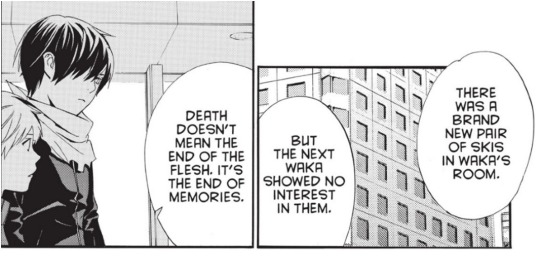
The relation between reincarnation and memories can be examined in two different yet intertwined directions: the mechanics of rebirth, which has to do with the believers’ memories, and its aftermath, i.e. the loss of god’s own memories.
We all know how gods are able to reincarnate: they simply need people to remember them. Their names play a huge part in it, since those are what give humans something their memory can latch on. After all, believers don’t usually become friends with gods and shinki, like Hiyori does; they pray to gods knowing only their names and what they do. Of course, gods also have images of them, but those mostly reflect people’s ideas of what a god should look like based on their functions, and they have nothing in common with the gods’ real appearance (in Noragami). A name in its usual meaning isn’t a necessary requirement either: Kofuku goes by binbougami, or god of poverty, outside of her immediate circle of friends, with her “profession” substituting a given name.
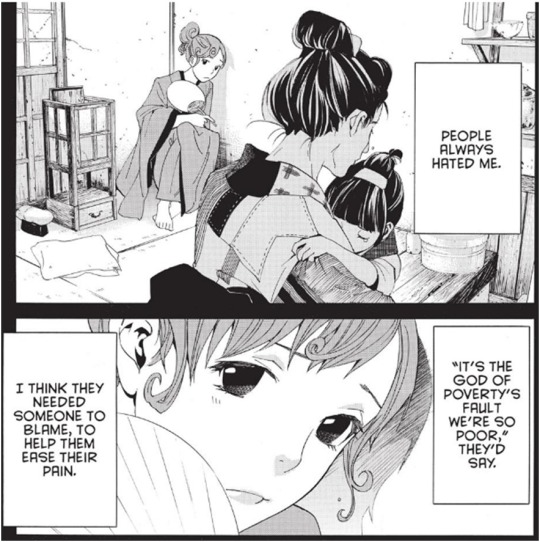
A god who has a name (a personal one or, like Kofuku, something that stands in for it) can be reborn as long as there are living humans who remember them, because it means that the god is needed, that their existence has a meaning to it. I think that this dependency on humans’ memories is the reason why gods don’t retain their own memories after rebirth.
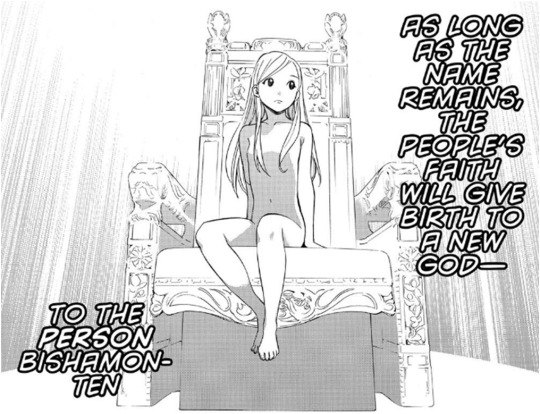
“Person” here doesn’t refer to a god’s individual personality traits, but to their so-to-speak material form – the idea that there’s someone out there who can help you solve your problems materializes in an entity shaped like a human. Therefore a reborn god shouldn’t have any memories, because the reincarnation isn’t their choice, but a response to people’s needs. Except humans don’t and can’t possibly know anything about a god’s personal history, so they can do nothing to help him or her retain their memories. Besides, it’s not like a god needs to have a personality, goals and ambitions; all they need to do is fulfill their role, do their job. And yet, while they don’t have any memories, newly reborn gods still have some sort of an instinct that lies in the core of their character.
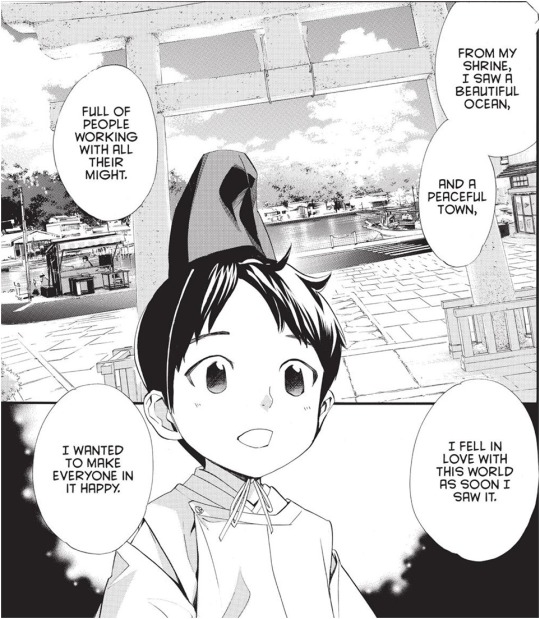
Now, even though I’ve just said that gods shouldn’t have any memories after reincarnation, is that really the case?
Two scenes from the manga gave me an idea that, perhaps, gods can remember at least their names – the ones that they are commonly known by among humans and contributed to their reincarnation the most.
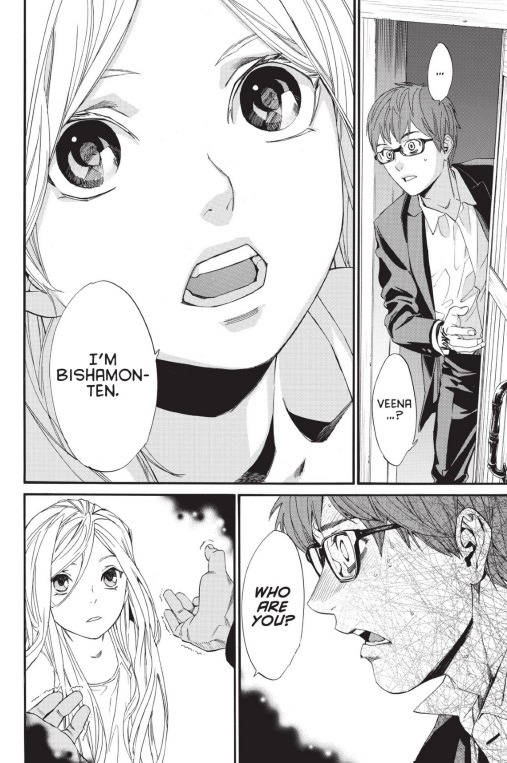
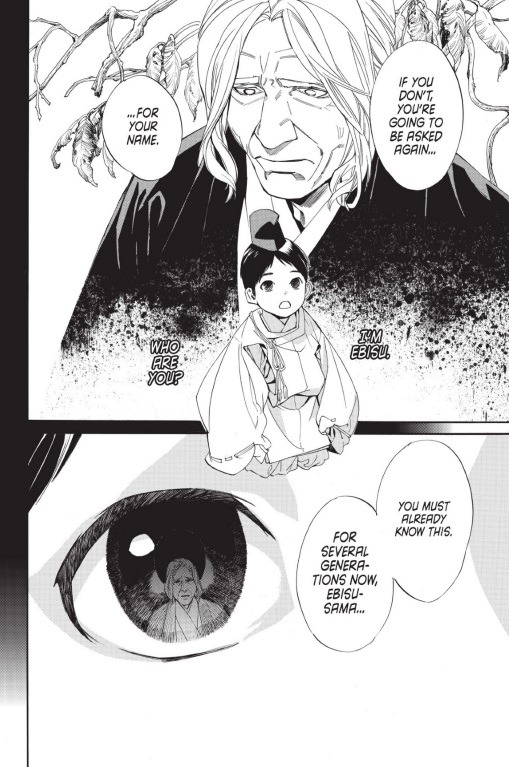
Neither Bishamon nor Ebisu seem to remember their guideposts’ names after being reborn, but provide their own names instead. Keep in mind though, that neither scene is corroborative evidence that this is canon. Bishamon’s replacement was only Kazuma’s premonition that (as of now) hasn’t come true. Kazuma has been and will keep doing anything to preserve the current Bishamon; he will kill and betray as many times as needed. It’s only natural that Veena’s rebirth and the loss of her memories would be his worst nightmare. As for Ebisu’s case, everything’s not that simple either. After his execution in chapter 35 he reappeared at his Miho shrine – compare the image of Ebisu above with the IRL picture of the shrine’s torii:
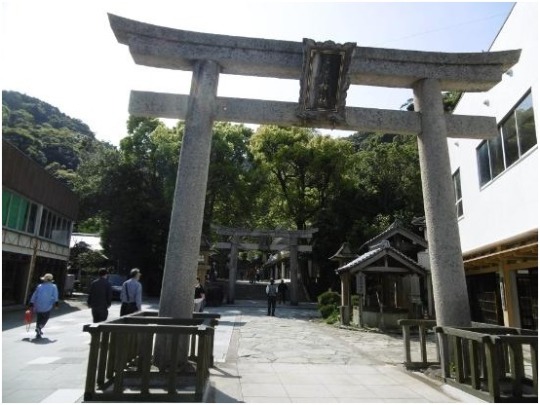
Miho Jinja is one of the largest Ebisu shrines. It may be that, in Noragami universe, it’s his main shrine where he usually reincarnates. When he was hiring a new bunch of noras in chapter 73, he did that at his Miho shrine, too.
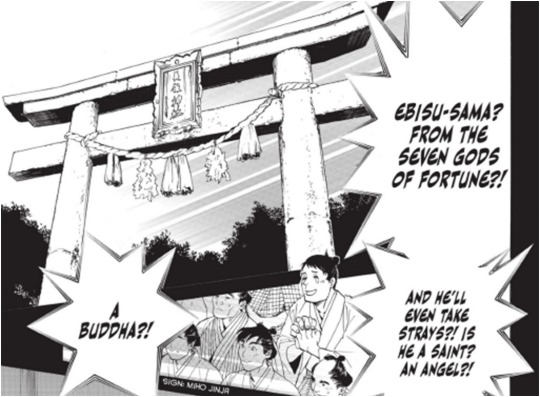
And even if Ebisu reincarnates at a different shrine each time, Iwami is unlikely to be there, too, since he’s probably in Takamagahara. It means that Ebisu could have learnt his name from his other shinki that stay at the shrine before meeting his guidepost. Still, the fact that the authors bothered to include these scenes in the manga could mean that, theoretically, gods can remember their names after reincarnation. It’s not that far-fetched considering the god’s dependency on humans’ memories. People may not be able to preserve the god’s own memories, but at least they can give them their names back.
Another interesting thing about reincarnated gods was shown (though not really expanded upon) in chapter 86. In that chapter we’ve learnt that various incarnations of Ebisu have a habit of burying a box with his complaints and fears in the exact same spot, and every new Ebisu finds it sooner or later.
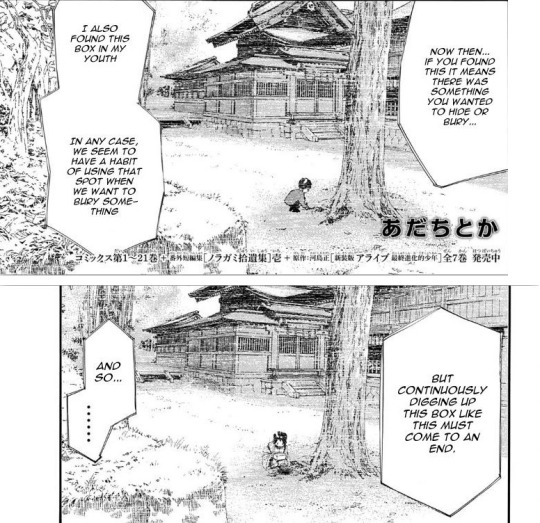
The late Ebisu says that all of his incarnations have been discovering this box whenever they wanted to hide or bury something and would subconsciously choose this place. This time wasn’t an exception: mini-Ebi found the box when he needed to bury his seahorse Takemika. The late Ebisu used this peculiarity of his to his advantage, burying a USB-card with information on the sorcerer alongside all the other stuff in the box before going off to Yomi. He gambled on the next Ebisu needing to hide something and finding the box, and didn’t lose (he is a god of fortune, you know).
By the way, the place where Ebisu keeps hiding the box is, again, his Miho shrine, where he reappeared after being slain and where he was hiring noras when Kunimi came into his service.
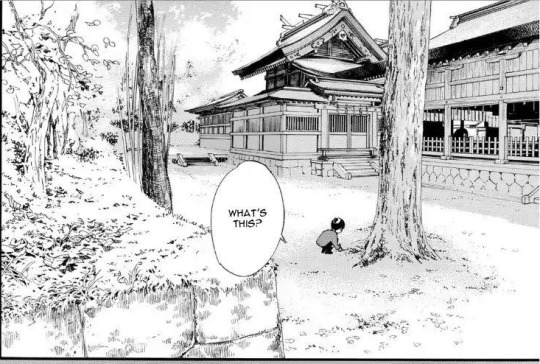

Why does every Ebisu keep coming to this spot to hide things? When Takemika died, Ebi didn’t seem to have some sort of realization that he needed to come to this particular place. He probably didn’t want to dig a grave in Takamagahara, so he used one of his biggest shrine (or maybe his main shrine) to come down to Nakatsukuni and bury his pet there. Yet somehow he ended up choosing to do that under the same tree that all those other Ebisus have been spotting, too.
Does it mean there are still things left to discover about gods’ reincarnation? Is Ebisu unconsciously drawn to the shrine that seems to be his starting point after each rebirth? As of now, we don’t know.
P.s. I keep thinking about a sentence I wrote earlier, that gods lose their memories because their believers don’t know them personally. Hiyori knows Yato, they have lots of memories together. Can this mean that if Yato dies and then reincarnates thanks to Hiyori and not Father, he will be able to retain at least the memories that are tied to her?
#noragami#noragami manga#ebisu#bishamon#theories#I thought I would be writing about the importance of memories but ended up doing an anlysis of the lore#maybe next time#noragami meta
57 notes
·
View notes
Note
ughh the thing that pisses me off so much about Kate/the hs^2 team is that even if their writing wasn’t full of harmful rhetoric, stereotypes, and awful representation, it would still be poor form to respond to genuine fan criticism with “you are pigshit.” and that’s what your recent anons don’t seem to get! if you’re an author, even if someone dislikes your work, you can’t just call them pigshit. it’s called being a fucking adult about things. I’ve never seen another author so immature.
This is something that I’ve tried to go over a few times, tbh. Cus like, here’s the thing.
I’m doing my Masters in Creative Writing. One of the BIGGEST things we go over, the thing they emphasise so much, is your online persona and presence. It is KEY as a writer that you interact with your fans in an appropriate and responsible way, because that is the only way you can connect with them - and you want your fans to like you, to respect you, so that they’re more likely to stay fans for the longhaul of your career.
As a writer, you also have a voice. A pretty big one, at that. People are going to listen to you because they look up to you; you can bring awareness to things that they might not have seen because, hey, their favourite author pointed out that the BLM movement is still ongoing and needs more help, or that the transmisogyny in Reeta Skeeter from Harry Potter is kind of fucked, as is the anti-semitism of making goblins the ones that hoard all the money in Gringots.
People are more likely to agree with you, too, to believe your point of view, as their favourite author. And more than anything, it will always, always mean more to people that their favourite author actually took the time to understand what it’s like to be part of the LGBT+ community, or to figure out what counts as an anti-black or anti-semitic stereotype, or to work out what a “scary” mental illness like psychosis actually looks like - and it will always benefit these groups if they talk about them, if they write characters like them.
As a writer, you have an incredible amount of responsibility online. You can do so much good. You can also do so much harm. If you’re going to become a writer, you have to be prepared for this - have to make sure it’s what you actually want to deal with - especially if (like Kate) you intent to make a profession out of it.
Kate lists herself as a writer. This is her job, it’s how she makes money. She is an author, a writer, it’s her profession - and yet she refuses to take the responsibility wanting to be a writer entails. She refuses to take on this importance because she values her own shitty opinions too much to consider listening to people, to critics, because she took one look at her online presence and decided that being a writer could be excluded from it.
And this, I think, is why as much as anything she comes off as so childish. When someone has genuine criticism, when a fan is genuinely upset, as a writer you should listen. You should sympathise, empathise - you should explain your reasoning and then ask if there’s a way you can do better. 9 times out of 10, your fans will be happy to just understand why you did something - and that other 1 time, they’ll be more than happy to educate you, to help you improve.
When you respond to your fans with “pigshit”, you’re just showing them that you don’t care. That their opinions mean nothing to you, that you refuse to take responsibility for the things you’ve done wrong. When you call them “pigshit” over criticism regarding harmful rhetoric, stereotypes, and awful representation, you tell them that you want to actually hurt them. That you have made the active decsion to make it as painful for them to read as possible, and that you refuse to make it better.
It’s frustrating, too, because the pro-Kate anons I’ve been getting have actually held me to this standard. They see me as the voice of the anti-HS^2 side of the fandom (one anon even almost accusing me of it, outright), and they expect me to respond as someone with that responsibility would. They don’t see me as a just fan who barely has any presence outside of this blog in the wider community. A fan running a blog for free because they thought it would be fun and it’s something they enjoy doing.
This is why, I think, it’s so important to hold Kate responsible for the things she’s done and said. As an author, she needs to understand that her voice matters; that she’s responsible for the things she says online, and that people ARE allowed to be upset with her opinions, since they’ll reflect back onto anything she’s working on. If nothing else, people need to recognise that this behaviour of hers is wrong, not just on a personal level, but on a professional one - and that in no way should someone of her authority be responding to criticism in such childish and biting ways.
22 notes
·
View notes
Text
Hazrat Umar (radiyallahu anh) - The Second Caliph of Islam
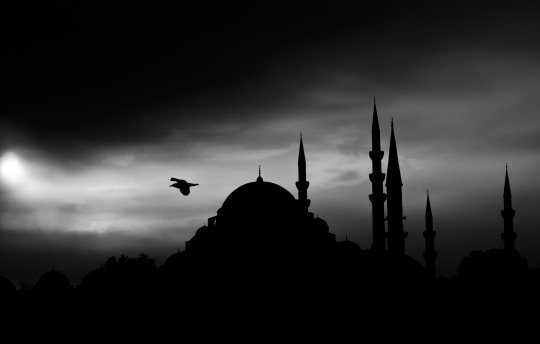
Hazrat Umar -radiyallahu anh- [634-644]
Before he was enlightened with the light of Hidayet, in the darkness of the ignorant, when he was a cruel person; He received the prayer of the Messenger of Allah and his eyes and heart began to open to the light of Islam with the influence of the Quran, which he listened to in his sister's house with anger. Umar, the son of the Jahiliyy, was now tearful, his heart full of compassion, and bent before the Truth.
Prophet Muhammad’s (PBUH) Love For Hazrat Umar
Hazrat Umar, who was likened to Hazrat Musa by our Prophet with his uncompromising and graceful structure; He had a mind, success, and genius who developed in the content of revelation. As a result of divine inspirations, many times his expressions were related to the verses of the Quran.
Our Prophet stated the following in his expression:
“Among the ummahs who lived before you, there were those who were inspired by them. If there is one of them in my ummah, it is undoubtedly Umar. (Bukhari, Ashab as-Prophet, 6)
His exposure to the truth in this way, to him; He was instrumental in giving him the nickname «Faruk» distinguishes right from wrong, good from bad, and right from falsehood.
In the words of our Honorary Prophet (PBUH), The wrath of this blessed person, whom the devil changed his way when he saw it, and whose language and the truth was put into his heart by Allah was directed only to the enemies of Allah.
In the face of truth, he would immediately show obedience and surrender in the face of an order or a sign of Allah and His Messenger.
The following incident reported by Ahmad bin Hanbal is one of the most beautiful witnesses of this:
One of the Numerous Loyalty Samples
Hazrat Umar radıyallâhu anh- was going to the Friday prayer one day during his caliphate. While passing through the wall of the house of Prophet Abbas, two drops of dirty water dropped from the groove on the roof - probably for cleaning - onto the robe of Hazrat Umar.
The caliph was bored and he reached out and dropped the gutter with his hand so that it would not drip on anyone else. Then he changed his robe and came to the mosque.
By referring to this event in the Friday sermon he gave, he said,
“–Community, you are doing wrong things. When I was coming, I was going through the wall or something. Dirt dripped from a gutter on me; I pushed it with the back of my hand and dropped that groove. " said. His word had just ended that Hazrat Abbas jumped out of his place and;
“–O Umar, what did you do? I saw it with my eyes; The Prophet (PBUH) himself placed that gutter there with his own hands. " said.
Hazrat Umar collapsed into the pulpit. What happened to him to spoil something that the Prophet (peace be upon him) had put forth! Immediately he recovered.
“Vallâhi, I will put my head against that wall. You, too, will step on my head with your foot, and you will put that groove back with your hand. ”and made up for his mistake by doing as he said. (See Ahmad b. Hanbal, el-Musnad, 1/210; Ibnul-Cevzi, Adjati's-safve, 1/285)
On the other hand, Hazrat Umar was very forward-thinking and fussy in order to preserve the religion. Praised by the Prophet as a door that does not allow mischief, Hazrat Umar (radiyallâhu anh) was visited by people and the tree under which his companions gave allegiance to the Prophet of Allah (PBUH) before the Musalaha of Hudaybiya at the time of his caliphate. When he saw that it was being imposed, he cut down this tree in order to mean that the ignorant would be caught in the poison that he had a divinity.
The Caliphate Of Hazrat Umar
One of the most important qualities of the caliphate of Hazrat Umar, who trembled out of fear of Allah and lived-in conviction, despite his high spiritual position and being heralded by the Prophet of Allah, was his unique justice.
The Emir of the Believers, who were called Umarul-Adl in the meaning of “the very thing of justice”, felt responsible even for the wolf that would plant a lamb near the Tigris.
After Hazrat Umar -radıyallahu anh- took office, he was in sorrow and anxiety due to the weight of his profession. Huzaifa saw him in this state and learned the reason for his sadness - radıyallahu anh-;
"–That's what hurts you, goddamn we'll fix you once we see you doing something wrong," he said.
Halif was very happy about this, he repeated his words Huzayfa -radıyallâhu anh- with an oath and;
"- Praise be to Allah, among you, among the companions of the Prophet Muhammad (peace be upon him) and peace, be upon him, there were people to correct me when he saw my mistake." he said thank you. (Ibn-i Abi Shayba, Musannef, VIII, 154)
The fact that he went to Damascus with his slave and his camel in turn and came to the city on foot, despite all the insistence of his slave, went down in history as an example of justice, humility, and brotherhood. In the middle of the night, he ran to the rescue of the silent cries of the poor and the poor with his food sacks in the streets of Medina.
In the period of Hazrat Umar, the land of Islam; It had expanded to the borders of Iraq, Damascus and Egypt. A large number of spoils had been obtained. However, Khalifa had agreed to receive only an allowance from the treasury. Because he is with everything, in the footsteps of the Messenger of Allah and Hazrat Abu Bakr;
On the Way of Two Friends
He was running his life half hungry, half full of trouble, sometimes borrowing.
The notables of the Companions were saddened by this state of the caliph. They wanted to increase his salary. However, it was very difficult to tell him about this issue and to convince him. For this reason, they requested our Prophet's wife Hafsa, who was also the daughter of Hazrat Umar, to submit this offer to her father.
Hazrat Hafsa -radıyallahu anha- opened an offer to his father to raise his companions' salary for the caliphate and save him from boredom. Thereupon, Hazrat Umar -radıyallâhu anh- reminded his daughter Hafsa of the past;
"-My daughter! How were the Prophet's food and clothing? " asked.
Our Hafsa Valley;
"- It was the amount of Quran (enough for scarce opinion)." When he gave his answer, Hazrat Umar explained with the following elegant example that the wisdom of his life in hardship was to obey the Prophet of Allah and his predecessor, Hazrat Abu Bakr, in return for the abundance of treasure:
“–Two friends and that I am like three passengers on an equivalent road. The first one of us had a machine. The other took the same route and got the first. Thirdly, I would like to reach my friends. If I go too high, I can't keep up with them! Or wouldn't you want me to be the third on this road? " (Sehbenderzade Ahmed Hilmi, Tarih-i İslam, Vol . I, p.367 )
In the end, he drank the sherbet of martyrdom with the wish of a spotless and white life in the footsteps of his two friends and was buried in Rauza-i Mutahhara next to his two friends.
Hazrat Umar Quotes
How wise are the words of this great Companion, who is a sharp sword that separates truth and evil from divine inspirations;
“Wisdom is granted to an individual who leaves an excessive amount of talk.
Humility is granted to the heart of those who leave the gaze too much.
The taste of worship is granted to those who stop overeating.
Whoever leaves much laughter is granted majesty.
Honor is granted to those who leave humor.
A love for the hereafter is granted to those who leave the love of the world.
He who ceases to deal with someone else's shame is bestowed with the correction of his own faults.
The person who abandons research and incarnation in the state of Allah (which is beyond understanding) is granted salvation from discord. "
"The person I really like the most is that one who informs me of my shame and flaws." (Suyuti, Tarihu'l-hulefa, 30)
Someone was praising another person next to Hazrat Umar. He spoke of him in a reproach. Hazrat Umar asked him three questions:
a. Have you ever traveled with him?
b. Have you ever dealt with a transaction like trade?
c. Have you been neighbors to him morning and evening?
When the person says "no" to these three questions, Hazrat Umar:
"I swear by Allah, who is not any god but Him, you don’t know him!" (Al-Ghazali, Ihya)
Kadı Şurayh wrote a letter to Hazrat Umar and asked how he would rule. Hazrat Umar said:
« Judge by what is in the book of Allah. If you cannot find it in him, judge according to the sunnah of the Messenger of Allah. If not in the book of Allah and the sunnah of His Messenger, judge with the decrees given by the righteous. If you are not among the judgments made by the righteous, you can judge if you want, stay back if you want! I am of the opinion that it is better for you not to stand back and make a judgment.
“Don't dress women too beautifully. If one of them has a lot of clothes and nice ornaments, they will like to go out. " (İbnu'l-Cevzi, Menakıb)
“To correct people, you must first correct yourself. The most ignorant of the people is the one who sells his afterlife for someone else's world. "
“Be strong without violence, soft without showing weakness! "
The Final Thought
Let us make us one of his servants who can reflect the smiling face of Islam with his knowledge, wisdom, lust, justice, humility, and all praised moral virtues, by dispensing personality and character.
Amin!
5 notes
·
View notes
Text
Like Moths to a Flame, Chapter 4
Fandom: North and South
Title: Like Moths to a Flame
Rating: NC-17
Pairing: John/Margaret
Synopsis: “I hope you realize that any foolish passion for you on my part is entirely over.“ Margaret decides to confront John about his unjust judgment of her character, but the two have always been drawn to each other, and things quickly get out of hand. In the aftermath, she agrees to marry him to satisfy propriety, but she cannot forget how ready he was to believe the worst of her. Can love survive without trust, or will the two find a way to work through the misunderstandings that have plagued their relationship from the start?
Chapter 1
Chapter 2
Chapter 3
John’s temper had cooled by the time he returned to the mill, assisted by the cold winter chill that whipped down the narrow streets and reminded him all too painfully that he had left his outer garments behind. How foolish of him, he recognized with a sardonic smile as he strode through the mill’s front gate. His race across town without a coat had attracted its share of askance glances from passersby, but the fulsome expression on his face deterred both question and comment. Any other man might have had cause to worry that his inappropriate attire might attract salacious gossip, which might eventually find Margaret as its target. However, the Master of Marlborough Mills had long carried a reputation for a fierce temper, and so he had little cause for concern that she be suspected as the cause for his black mood on this particular day.
As he neared the door to the mill, he cast a glance at his darkened office window. his preoccupation with Margaret had distracted him from his duties for too long. The heavy weight of his responsibilities pressed upon him, weighing down his shoulders with the reminder of tasks left undone. Work would provide a welcome distraction from memories of Margaret’s touch and her rejection, but he reminded himself that there was one more task he needed to fulfil before he could turn his attention to more commercial matters.
At this hour, he knew his mother would be at home. He had to tell her of the offer he had made, though he would naturally never disclose the reason for it. He had considered keeping his own council until the morning, when he received Margaret’s answer to his suit. However, he knew his mother’s low opinion of the woman he loved, and if the reply he received was in the affirmative, she would need time to grow accustomed to the idea.
It would not do to join her as he was, his clothes in disarray from his exertions, both in his flight across town and in the pleasure he had found in Margaret’s arms. Before entering the drawing room to break the news, he took a moment to return to his room, to change clothes and pull himself to rights.
As he finished tying the folds of a fresh cravat, he paused by his looking glass, gazing at his reflection with a critical eye. Though his lips still burned from her kiss and he imagined he could scent the smell of her skin when he closed his eyes, his appearance no longer betrayed his previous actions. He would pause downstairs long enough to tell his mother of his impending engagement, and then he would head back to the mill, immersing himself in his work to forget the words that had met his proposal.
“ Was this always your plan, then? You couldn’t purchase my hand, so you thought you could force me into a marriage of responsibility when you know that is the last thing I want?”
She did not have the right of it, and if she accepted his suit, he would find a way to prove as much to her. Although the situation seemed dire at present, he had some small cause to hope she might one day come to care for him. She had given herself to him with a sweetness and a passion that suggested that she was not indifferent to him, at least.
“ I do not love you. I never have. I never will.”
He turned away from his reflection with a ferocious scowl. Margaret’s words had hurt, but he could not fault her for her honesty. He knew she did not care for him and had never been so foolish as to convince himself otherwise. Besides, he had more pressing matters to attend to at the moment, and he couldn’t afford to let his unrequited love distract him from his purpose. He had to tell his mother of his engagement, which would likely be forthcoming in the morning.
Schooling his features into a mask of indifference, he joined his mother in the drawing room. Her head was bent in concentration as she focused on her needlework, and he engaged in perfunctory small talk as he pondered how to broach the subject of his probable engagement. It didn’t take long for impatience to get the better of him, however, and he got straight to the point. “I have been to see Miss Hale.” His words distracted her from her work, which fell to her lap as she looked up at him. “I have made her an offer.”
His mother was not inclined to give in to rash emotion, and she fell silent as she gave him a considering look. “Miss Hale has opened herself up to the gossip of servants and public ridicule. If you think to save her from the consequence of her own actions by offering her the protection of your name, then you should know better than to think you could ever convince her to—”
“I don’t wish to marry her because I want to save her reputation. I wish to marry her because I love her. More now than I did the last – after the riot,” he corrected himself, not wishing to dwell on that particular memory.
It was, unfortunately, the truth. While his actions earlier in the evening necessitated that they marry, they were not the cause for his desire to do so. He wished to marry her for the same reason he always had: because he loved her. His love for her was untouched by time. By rejection. By the knowledge of her other lover.
The anger he had felt towards her since that night at the train station was unjust, he knew. Whatever right he might have claimed as her father’s friend to censure her for her improper behavior, for the gossip that she had invited, he had no right to more. He was not her brother or her father, who would have borne the responsibility to curb her behavior. Nor was he her lover, who should have claim to her fidelity. For her part, he doubted he could even lay claim to being her friend, to offer her advice and counsel.
His ire stemmed from jealousy, injured pride, and a wounded heart. He was angry at her for having chosen another man over him, for deeming dishonor preferable to accepting his heart. He showed her his temper so that she would not see his pain. But his anger was fleeting, ebbing and flowing like the tide. His love for her was steadfast and true, even if he professed otherwise.
His mother scowled. “You know she thinks too highly of herself to ever choose you,” she pointed out in her usual straightforward manner. John knew it was love of him that compelled her to honesty. Not the type to ever mince words, she was only trying to help; she didn’t intend to wound him. Her words stung nevertheless, since he knew she only spoke the truth. There was no question of Margaret having him, if she had any other choice.
“I believe she will accept me this time,” he murmured, moving behind the woman on the couch to rest a hand on her shoulder. “But whatever her answer, I’m asking you not to judge her too harshly. I don’t care about idle gossip, and neither should you. I’ll not have her treated with disrespect in this house.”
His mother huffed in irritation, but she lifted one hand to place over his. “Oh, I’ll treat her well enough,” she agreed in a sour voice. “As well as is in my nature, at any rate. For your sake. Not for hers.” Rising to her feet, she turned to fix him with a critical eye, making him relieved that he had taken the time to set himself to rights. “Though she’s never understood you, and she certainly doesn’t deserve you.”
Such was his mother’s love for him that he knew it unlikely she would ever look on Margaret with any more charity of mind than she did at present, so he bit back the denial that came readily to his lips and bowed his head.
Stepping forward, his mother reached up to straighten his cravat and smooth the shoulders of his jacket. “I know you love her, John, but it may not be too late. Your engagement hasn’t been settled on. There has been no announcement. Take tonight to think about what it is that you’re doing.”
“You would have me shame her by withdrawing my offer? To behave so dishonorably?”
Her expression was grave but sincere as her hands halted on his shoulders and she met his eyes. “I would have you marry someone who knows the man you are and loves you for it. I care about your happiness. Nothing more.”
Leaning forward, he pressed a kiss against her cheek. “Then pray that she accepts me, Mother, for I cannot be happy without her.”
Across town, Margaret had taken to her room to gather her thoughts in Mr Thornton’s absence. She also found it necessary to change her dress; it would likely take an entire morning for her to iron out the wrinkles in the one she had worn during her tryst. She had barely managed to change before she heard the front door open, and she paused to touch up her hair before stepping into the hallway, throwing her father her brightest smile in greeting.
“Is John still here?” he asked with pleasure as he joined her on the upper landing. At her negative response, a slight frown crossed his brow. “Oh. I thought I saw his things down below.”
Her face flushing with embarrassment, she murmured, “He was called away quite suddenly. Something to do with the mill, I believe. I’m afraid he may have forgotten them in his haste.”
His face maintained its abstracted frown. “That’s unlike him,” he commented. “I am sorry to have missed him. I hope he wasn’t too offended.”
To the contrary, he’d been gravely offended indeed, though not by her father’s actions. Ducking her head so he would not see her blush, she replied, “Not at all. He mentioned he might call upon you tomorrow, if you are free to receive him.”
To her relief, there was no trace of suspicion in her father’s face or voice as he agreed heartily with this idea, turning his attention immediately to more intellectual pursuits. For her part, their exchange, short as it was, had been a trial to her already fraying composure, so Margaret begged leave to take refuge in her room for the evening, pleading a headache. It took a few more moments to reassure her father that her complaint was a mild one and she would recover shortly, and then she watched with relief as he returned to his sitting room to continue his work.
Once the door had closed behind him, she crept downstairs to collect Mr Thornton’s things, telling herself that she only wanted to ensure they were on-hand to return to him the next day. However, once returned to the privacy of her bedchamber, she clutched his coat to her chest as she lowered herself onto the bed.
She had made such a mess of things, and in the wake of her desperation and indignation, she could only be ashamed of the things she had said. She supposed she should probably be more ashamed of the things she had done. She had behaved shamelessly and undoubtedly only succeeded in demolishing any chance she might have had of resurrecting his good opinion of her character. But deep her in heart, she found she could not regret the passion they had shared.
Margaret might not be wise to the ways of the North, but she was not a stupid woman. Since moving to Milton, she had resigned herself to the likelihood that she would never marry for love – if she married at all. She had few romantic prospects among the population, and no money to attract a suitor even if eligible bachelors had been thick on the ground. Though she had naturally always longed for her own home and family, she had refused to give in to despondency in accepting her lot in life. She might never have a husband and children of her own, but with so many in need in Milton, her life would never be empty.
Better spinsterhood than to rush into an ill-advised match with no possibility that genuine affection might eventually blossom between both parties. And regardless of what Mr Thornton had said, she had little hope that they might form a genuine attachment within the confines of marriage.
Margaret knew she had lamentably opened herself up to gossip and ridicule by her behavior during the riot. Though her wits had temporarily been scattered, she had heard the malicious pleasure in Fanny’s voice when she speculated that Margaret had always had designs on her brother. Innocent though she may be in the ways of the world in many respects, she knew the rapidity with which gossip could flow from household to household, until its subject could find no respite from the censure of society.
On her very first day in Milton, she had become aware that her family was and would be the subject of gossip. Even of derision. She had found it hard enough to acclimate to life in this industrial town and had little care for the chatter people spread about her strange ways, having more or less resigned herself to her position as eternal outsider.
But while she could withstand the derision heaped upon her for her strange ways, she could not abide the speculation that she had designs on Mr Thornton, or that she had ever had intent to trap him into marriage. That others might think it of her was appalling; that he might come to believe it of her was unable to be borne.
Regardless of his protestations, it had been honor – not love – that had driven him to ask for her hand after the riot. After her brazen behavior, he could hardly do anything less. Though she had been unjust in her sketch of his character upon their first meeting, she had come to realize that John – that Mr Thornton, she reminded herself once again – was an honorable man. More than that, he was a good one, with both a kindness and a thoughtfulness that she once would have sworn was lacking in his character.
No, although she knew she should regret their time together, she found she could not, save in one respect. She should have anticipated the outcome. For the sake of honor and his own damnable pride, she should have known he would offer for her hand. He would see it as his duty to rescue her reputation.
She had been unkind – unjust – to him in the aftermath of his second proposal, but her words had been spoken as much in self-preservation as in ire. Margaret might not have had the good sense to consider the inevitable outcome of their coupling, but she had no doubt of the end result of their ill-conceived union.
Thornton claimed he loved her, but he did not trust her. He did not believe in her. He had made that clear enough. Once honor and pride had been satisfied, all that would be left for him would be regret. Regret that he married a woman he considered faithless. In time, he would come to resent that he had not been free to marry a woman who remained blameless in his eyes and in his heart. Though he might not ascribe much faith to the gossip of servants now, how long could he withstand their relentless speculation before he began to wonder if their words might not be true?
Margaret had been the first to come to him, after all. She had stolen a kiss from his lips in the front hall of her own house, where the two could be discovered at any time by her father or their servant. She had begged him to stay. She had seduced him in her own home, knowing her father or Dixon could return to catch them at any time.
He might not credit such thoughts now, but he likely would in time. Did the gossips have the right of it? Had her behavior been a ploy from the start, her intent all along to trap the most eligible Master of Marlborogh Mills in the parson’s noose?
She could not bear the thought. She might not love him – she swore she did not, for how could she love a man who did not trust her? – but she could not bear to watch whatever small measure of respect he still had for her diminish, first into regret, then into disgust, and eventually into hate.
She had been wounded and angry that he would once again propose out of a sense of duty toward her, but she had also been deeply, deeply afraid. Oh she had no thought that she might one day have cause to fear his person. Even in his reproof, his doubt, his disgust for her, she had never been given cause to fear he might hurt her, and she thought well enough of him not to fear that his character would undergo such a marked change after their marriage. Even when his doubts and contempt for her grew, she felt certain that his disfavor would be displayed in cold courtesy rather than physical violence.
But cold courtesy from John would be terrible enough.
“ There is little enough I can offer you, but I can promise you that I will always treat you with honor. … You will have no cause to regret marrying me.”
He saw her as an obligation, and if there was one thing Margaret did not wish to be, it was Mr Thornton’s obligation. She was not a cruel woman, but she had allowed herself to act in a cruel manner in an attempt to push him away.
She had not lied, she swore to herself once again. She did not love him. She did not. She did not! She could not love him. Could not allow herself to love him, when his opinion of her was so dismal. And she had little doubt that he would never allow himself to love in return, where he deemed the subject of his affections so unworthy.
Of course, it would be a simple enough matter to tell him the truth about Frederick, to reassure him that, which she had not been without fault, she was blameless of the charges he had laid at her door. But she could not. The truth might wipe away the object of his accusations, but it would not remove the cause. He did not believe in her. He did not know her. He did not trust her. He did not love her. There had once been a time when she had sworn she would never seek his love, but the loss of his good opinion had left her heart tender and bruised. She could not marry him. She could not.
Yet she had no other choice. She knew it as well as he had when he’d offered for her hand. Clutching the thick fabric of his coat closer to her stomach, she bowed over the precious bundle as much as her corset would allow. It was one more thing she had not had the wisdom to foresee before she’d behaved so wantonly. Even now, she might be with child. His child. She might be willing to withstand gossip for her own sake, but she could not do that to an innocent babe.
She would marry him. And she would pray he would not come to hate her for it.
#north and south#john thornton#margaret hale#fanfiction#my fanfiction#like moths to a flame#john x margaret
8 notes
·
View notes
Note
hello. i want to write a story set in a very religious place. like fanatic level of religious. in my mind, this place is ruled by what the church says but has a "cover" figure to "connect" with the people. the people of this place are devoted to their religion, meaning they know passages, go to mass, and shun those who don't support it. here is my question: how does one go about creating a religion that feels real? what do i need to take into consideration (i'm not religious myself).
Mod Miri Note: At the same time this came in we also received from the google form the question “How do I world build a religion?” I can’t confirm they’re the same anon, but we’re combining them for the answer.
Brainstormed: You seem to have a very… narrow perception of religion? If you aren’t religious yourself and you’re (presumably) from a Western culture, it makes sense that the Christian church and more specifically Catholicism are your go-to images of hyperreligion. Saying “mass” and “church” and “passages” kind of gives away the fact that you’re trying to base your religion off of at least your idea of an Abrahamic religion, but I’d ask you to reconsider. Right now it sounds like you’re trying to create a negative critique of these religions, and even if that is what you’re going for, you need to do a lot of research on their theology, history, and practices before you can do so with any competence.
I’d suggest doing some basic research on types of religions, like animism, pantheism, polytheism, general superstition, etc. There are plenty of spiritual worldviews that you might consider way over the top, but whose believers find it more bizarre when people don’t follow their teachings. Fanatics are never fanatics in their own mind, and especially among their own people, but also… fanatic might be a relative term. If you’re approaching this from a nonreligious background, then you might consider X-amount of religion in one’s lifestyle to be fanatic-level. Whereas a person who actively practices religion would consider X-amount to be perfectly normal, and only folks who take it to XX-amount plus some shadier practices are the true fanatics.
Remember, religions start because people want to make sense of the world. There is a deeper feeling of wonder and personhood and power, both within a human being and in the whole world around us, that drives spirituality and generates superstition. Religion, at least to start, is beneficial to people, otherwise no one but sadists would follow its teachings. Now, like anything else, religion can devolve into a means of power hoarding and control of a populace, but only because of the people in charge getting greedy. The vast majority of religions I’ve studied have had radical, freeing, empowering teachings applicable to everybody when they first sprang up, and only later did adherents twist those teachings into societal oppression. If there is no satisfaction or benefit in your religion, there won’t exactly be any incentive for people to follow it so closely, aside from whatever negative consequences occur for those who fall away. And negative consequences aren’t often enough to keep people in a religion. If following religion is more painful than the consequences of leaving it, plenty of people will jump ship.
Religion can also show up in every single part of life. According to Wikipedia:
A religious experience (sometimes known as a spiritual experience, sacred experience, or mystical experience) is a subjective experience which is interpreted within a religious framework. The concept originated in the 19th century, as a defense against the growing rationalism of Western society. William James popularised the concept.
You look up and see a cloud, a spiritual person sees a portent, or a spirit, or a castle where the gods live. You take a break from work for a minute, a spiritual person now has time to mutter a prayer, or observe the mood of the world, or dedicate their work to their god. A person doesn’t have to be anywhere near a fanatic to have their religion be in every part of their life. Especially if they adhere to a more lax spirituality or superstitious worldview instead of an organized religion, the central spiritual experience of religious belief alters the perception of self and surroundings. It isn’t only a set of rules to follow.
It can even help areas of society that modern Western society considers nonreligious! Historically, medicine has always come under religion. Witch doctors, medicine men, witchcraft, even the hygiene laws laid out in the Christian Bible. Physical health has often been considered a reflection of spiritual health, which, in a way, is true! The placebo effect means tending to one’s mental and emotional health with the reassurance of religion will improve one’s physical health as well. Not only that, but the power of a “spiritual experience”, regardless of if you believe the supernatural is real, can cause religious ecstacy, something you might perceive as a serious psychological problem but those who experience it consider to be a deep form of spiritual expression to be treasured and sought after. The spread and preservation of information is also often aided by religion, even though that can change should those in power want to change history or obscure truth for their own reasons. Just look at the history of the printing press and how that was driven by the need for Bibles. Many cultures, most famously Australian Aboriginal peoples, have oral histories thousands of years long that tie in closely to their spirituality.
You also might be confusing religion with cults. If you think all religion is predatory, playing on people’s weaknesses and fears in order to coerce them into a miserable lifestyle of following strict laws and living under control of those in power, you definitely have conflated “religion” and “cult”. If you’d like to worldbuild a cult, go ahead! It’s likely to be smaller and less acceptable than an established organized religion, not very transparent to the outside world nor its members, and have a spirituality that is in fact just a veneer over gaining power, instead of genuine belief and devotion, and may in fact require people to murder or commit suicide. Just look at Scientology, or these, or even Jared Leto, and a more in-depth look from this organization covering many different kinds of cults.
On a more worldbuildy note, are those who practice this religion correct? Does their god(s) exist? Is the supernatural real? If yes, then are they really fanatics if they’ve been right all along? Even if they’re incorrect, the dedication and deep-held beliefs of religious people shouldn’t be mocked wholesale, in my opinion. Make sure to keep some genuine three-dimensional development for characters who are part of this religion, or include other religions with different practices, or the only thing you’ll accomplish is “waaaa religion bad believers dumb”. And if that is the story you want to write, feel free, but I can’t help you there.
Feral: What makes a religion feel real? Sincere faith.
Specifically among the leaders. I mean, sure, those lemming-like peasants who actually believe that superstitious nonsense will have sincere faith, but honestly? There is going to be a higher percentage of people faking it among the masses than among the clergy. Clergy members are generally required to go through rigorous studies and often take vows that can cause great discomfort. I am sure there are those who did it for the power - there are in atheist organizations as well, humans can be crap - but if you actually read the writings of important Church leaders of the past, not to mention rabbis, imams & mullahs, and archakas, you’re going to find that they have sincere faith.
Something you should always keep in mind when developing pre-modern religion in a Western context is that before the advent of modern scholarship, which starts to become a thing in the West during the Renaissance, all the important scholars were clergy. And again, those learned people either had to be really, really dedicated to their power-hungry ambitions or had to have sincere faith.
That does not make religions perfect by any means nor does it mean that the god they have sincere faith in is omnibenevolent (though the qualities of an omnibenevolent god will be strongly dependent on the culture that worships it). And religious leaders are absolutely capable of doing terrible, terrible things even if they profess to worship an omnibenevolent god, and politicians can definitely twist things around to suit their needs (again, this is not exclusive to religiosity). But your ask has this weird given that a major religion (on par with Catholicism/Christianity) in your world is a scam, and while yes, that happens in cults and alternative religions and in splinter groups*, as Brainstormed pointed out that’s just not how, at least, the four major religions of our world got started.
Yes, it’s true that bureaucracies of a certain size and age will inevitably begin to change focus to protecting its own existence. And yes, it’s true that ambitious sociopaths will be drawn to places of authority even if they are difficult to achieve. And yes, it’s true that an individual entering a toxic environment is more likely to be changed by the environment than to change the environment. But guess what! That has nothing to do with whether the organization is religious or not.
Why does a religion exist in the first place? It explains the universe in a pre-modern world; it provides organization and structure for community focus - in other words, many social programs have historically been run through religious organizations and leadership. And it provides hope and comfort in a very scary world.
Some clergy might be able to fake all of that for a little while, but a large bureaucracy with many clerics who are all in on the fake? No. Allow me to rephrase: hell no. People are not dumb. Maybe you believe that of all religious people, but you are wrong and they are not. The people in your world, if they’re anything like the people in our world, are gonna sniff out the bullshit if none of their religious leaders believe what they’re selling. There is a reason Scientology has to keep blackmail files on all its adherents, and I promise you, the Catholic Church does not do that.
*A note on cults, alternative religions, and splinter groups: Cults and alternative religions (their PR friendly name) are “religions” that are scammy and/or actively dangerous to the participants or others: People’s Temple, Branch Davidian, etc. Splinter groups are congregations that start as normal members of a large religion or denomination but its insular culture creates a divide that just takes things a little too far even for the most fanatical of the main sect (think terrorist groups that link themselves to religions). These types of religions might be what you are actually asking about. Groups like these can be highly, highly influential but in a very contained area. What cults often do is the leader settles in an area and buys property and builds a church and maybe a school and then encourages the members to all move either onto the plot of land if it’s large enough or to buy up surrounding land and homes and push out all the non-believers. That area can then be fortified or just have a de facto boundary with the rest of the world. Sometimes a group like this can become large enough to constitute an entire town, but rarely a city - groups that large will more often have centralized compounds but with the members living scattered among non-believers, as Scientology does. Obviously a group concentrated like that will have an impact on local politics, if they are allowed to participate, but it’s not going to go farther than the county line, so to speak. As we all know from the news, splinter groups like ISIS can become very large and globe spanning, but those types of groups have within them splinter groups and factions, and I don’t think that’s what you’re asking about anyway, so I’m just going to leave it there.
But frankly, your ask reads to me as “how do I create a fantasy!Catholic that is secretly evil and will show the audience how evil religion is in the real world? Opiate of the masses!” And my advice is… don’t. Because it lacks compassionate understanding of people of faith (many faiths), it lacks a factual understanding of how world religions differ and function, it totally lacks nuance, and finally, because it is absolutely, monumentally, extremely, really, very cliche.
Maybe the way your ask is coming across to me is totally not how you intended it. Maybe you only used the jargon you used because you assumed we wouldn’t know any other terms and maybe your understanding of world religions is actually quite sophisticated. Maybe you really do have this insanely clever way to spin a tired cliche into some new and original. In these cases, we strongly encourage you to come right back with as jargon-full and specific an ask as you can write, use our submission google form to do it. Otherwise, give our responses some thought and if after you’ve developed your religion, you want to come back with a specific ask other than “how do I world build a religion?” (which is a little too broad), please feel free.
44 notes
·
View notes
Text
Todoroki Shouto
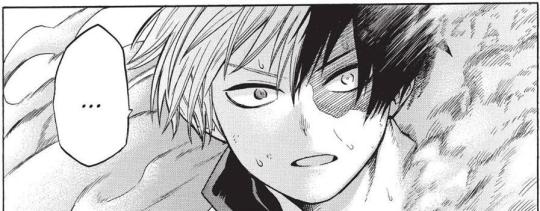
I felt like doing a character meme!
Favorite thing about him:
Is it cheating to say everything? It is? Okay… I love how he’s painfully kind while also painfully bad with people. I love how he swore not to use his fire half, and he took that oath so seriously that he felt pulling Midoriya aside to apologize and explain (in depth) was necessary. I love that his hand trembled when he went to see his mom—especially that he was so afraid of being like Endeavor, he couldn’t bear to show his face to her for years in case she mistook him again. I love how he learns from his mistakes, whether it’s combat-related like blocking his field of vision against Stain or emotional like realizing how his spiteful focus on Endeavor has blinded him to the needs of people around him. I love how he doesn’t feel the need to posture and act like he has the answers: he can openly admit he doesn’t know and that he needs to reflect more to find the right path for him. I love how rude he is. I love how he unquestionably leapt to Midoriya and Iida’s aid in Hosu. I love his fight against Midoriya.
Least favorite thing about him:
Hmm…most of my problems are with Horikoshi, not Todoroki. I like that Todoroki’s reaction to Endeavor vs the nomu was complex, that he was afraid for Endeavor, cares about him, and is ambivalent about the idea of Endeavor’s “redemption,” but I wish his love for his dad had more of a foundation—from what Horikoshi shows us, I have no idea why he cares about Endeavor other than a vague, dissatisfying “he’s my dad” feeling. Why are Todoroki’s feelings more complicated than flawless loathing? What’s the basis for his ambivalent affection towards Endeavor? I wish I knew more.
Okay, for about Todoroki specifically in-universe…I guess I wish he would talk a little more. He seems like he struggles with finding a middle ground between saying nearly nothing and oversharing.
Favorite line:
That’s a nasty scar you got there *SLUUURP* and are you All Might’s lovechild. I also loved it when Todoroki glared dramatically at Endeavor and then failed hard at introducing himself to the kids.
…And I love the line where Bakugo stridently claims no, he will not tell stupid Deku his brand-new, top-secret hero name, and Todoroki cluelessly asks, “Could you tell me, then?”
BROTP:
Midoriya, Bakugo, Yaoyorozu, Iida—I think those relationships really speak for themselves <3
This fic made me love Todoroki and Kaminari, please give me Todoroki working on his sense of humor and he asks Kaminari for help, only to repeatedly and ignorantly roast Kaminari while attempting to learn.
Also, Asui and Todoroki are really underrated; I feel like they’d have understated but interesting chemistry. They’re both exceptionally blunt, and unlike some of the others, Asui is perceptive+grounded enough to notice how awkward and uncertain Todoroki is (instead of the coolest, handsomest boy in class image). I’d LOVE to see them talk about their siblings, since Asui is the oldest and she takes care of her mini frog siblings, and Todoroki is the baby of the family who’s trying to figure out his relationships with Fuyumi and Natsuo (and eventually, Dabi). Oh, and Asui has more respect for authority than Todoroki does, so also seeing them clash over that would be interesting.
Or! Maybe Todoroki finally, accidentally catches Hagakure in one of his area ice moves and feels really bad about it, so Hagakure teaches him to watch out for her by making a game out of sneaking up on him. She also exercises some teenage flirtation in his direction and he has no idea.
Or imagine Jirou trying to figure out if Todoroki has feelings for Momo and accidentally becoming friends as she susses him out and realizes he’s an irredeemable dork instead of ice prince badass. She’s appalled he doesn’t know much about music!
OTP Rarepairs:
Todoroki/everyone basically, so it’s more interesting to talk about my todo rarepairs than run of the mill ships.
Todoroki/Shinsou is cute…they both enter class 1-a with the attitude “I’m not here to make friends” and get hit with a match versus Midoriya in the Sports Festival—oops! They both became heroes partly from antagonistic spite, to defy Endeavor / the stereotype of brainwashing, which throw long shadows over who they fear they could become, and despite being on the quiet side they’re both pretty dramatic. Idk much about Shinsou’s backstory, but he definitely has a bit of a depressed, wary aura about him together with his fiercely idealistic, “I will never be like that” attitude, a combination that would resonate with Todoroki.
Probably at first Shinsou would be pretty cold to Todoroki, since even after being accepted into class 1-a he’d have some lingering resentment for those who are naturally blessed and admission was a slam dunk, and, in an effort to prove himself against the quietest of the strongest students, he’d make it his mission to provoke+brainwash Todoroki. Despite himself, Shinsou gets attached as he tries to figure Todoroki out, and he realizes the sorts of obstacles this “naturally blessed, slam-dunk admission” student had to overcome to get here.
In short, I’m a sucker for it ok, brotp or otp i’m down, but also in this case the romantic element of seeing themselves in each other gets to me bad.
Second rarepair, Todoroki/Hawks—hear me out ok!! These two would have the funny elements of Hawks/Endeavor but without Endeavor’s grossness. Even after he makes pro, Todoroki admires Hawks as the number two hero whose playful, casual MO is radically different from his own, more solemn style, and Hawks delights in being obnoxious and pokes fun at the straightforward, a bit dense Todoroki every opportunity he gets. Todoroki recognizes Hawks’s playful demeanor and knows he’s joking, but…being a dork…he doesn’t know what to say, so he just responds with total seriousness. Hawks is perceptive enough to know Todoroki noticed the joke, and Hawks’s awareness of that transforms Todoroki’s awkwardness into a dry, deadpan sarcasm, and the two of them can actually, like…have banter.
Working with Hawks semi-regularly, Todoroki has to rise to the challenge of meeting Hawks’s quips with enough insight and empathy to intuit the bleaker truths behind Hawks’s facade as this guy who doesn’t want to work too hard. Todoroki grew up as Endeavor’s tool, Hawks grew up as the hero commission’s tool; Todoroki responded with defiance, Hawks responded with salty compliance; Todoroki prioritizes his personal moral compass over the law/government, Hawks prioritizes the government over both his moral compass and the law; and Todoroki admires All Might, whom Hawks professes not to be so fond of, while Hawks admires Endeavor, knows Dabi, and all the obvious issues that brings up—so I think these two have tons of common ground to build a rapport and also clash with each other in ways that would be interesting for their development. For example, Todoroki can tell Hawks it’s your power and encourage him to take hold of his own destiny instead of being used, and Hawks can help Todoroki work on the shortage of social acuity he inherited from Endeavor.
I love the brotp but the otp has such comedic potential fused with such tragic potential, like by taking hold of his fate Hawks makes some choices Todoroki can’t forgive, and by helping Todoroki learn to connect to people Hawks opens him up for a world of pain when things go south, I can’t resist.
NOTP:
As long as the execution is good, I’m good. A ship that I hate in one person’s hands, I might love in another’s.
Random headcanon:
Todoroki is the #1 cockblocker in Class A. Nobody kills romantic tension like Todoroki wandering in, oblivious to what he’s just interrupted.
Also, Fuyumi gave him The Talk.
Unpopular opinion:
Hmm…not sure how unpopular this is, but while Todoroki understands that Endeavor abused Rei, but I don’t think he understands that Endeavor abused him too. Clearly Todoroki understands that it was bad, but now he’s one of the best students in one of the best high schools in the country instead of on a psych ward (Rei) or in the ground (Touya), so he doesn’t realize just how bad it was. Sort of a, “I was strong enough to take it, so it wasn’t really bad, not like how he was to my mom.”
Also, I love tododeku and I love dadzawa, but I’m frustrated by the number of fanfics that portray Todoroki as meek and crushed under Endeavor’s boot, in need of rescue.
Okay, one last one, because I’m not sure how unpopular any of these actually are. I think Todoroki is actually pretty anxious to fit in with his peers? Like he seems pretty aloof and doing his own thing, but I think it’s more due to uncertainty over what to do than because he’s that naturally withdrawn.
Song I associate with him:
Unbreakable by Miracle, Ember by Katherine McNamara, and Brave by Riley Pearce come to mind.
Favorite picture of him:
OKAY HERE ARE A FEW
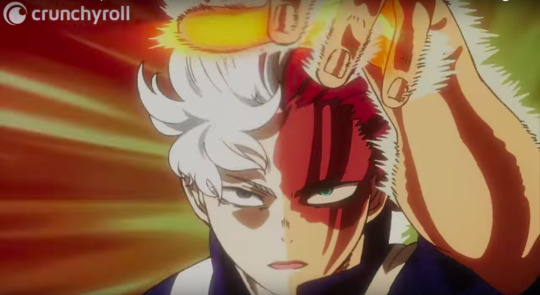
VS Midoriya – Todoorki’s whole awakening, self-actualization sequence is beautifully, beautifully animated. I love the flashes to black and white and the graceful, profound arc of Todoroki raising his left hand.
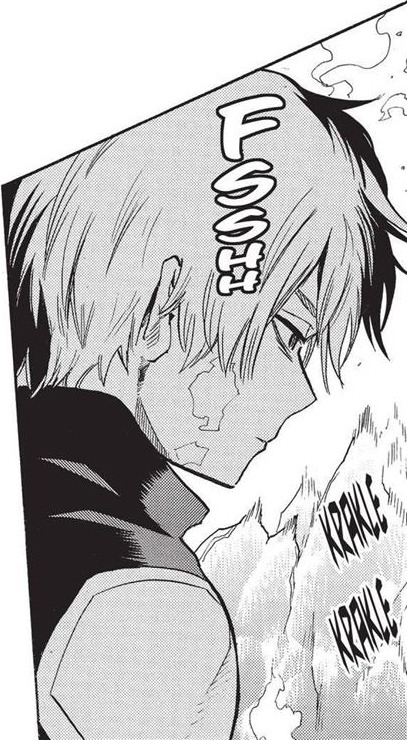
Ch43 – His haunted expression when he extinguishes his fire, forfeiting to Bakugo.

Ch63 – He looks so sweetly earnest when he realizes he screwed up by disregarding Yaoyorozu’s opinion, and he immediately takes action to fix it.

Ch112 – His badass expression when he and Inasa wordlessly team up.
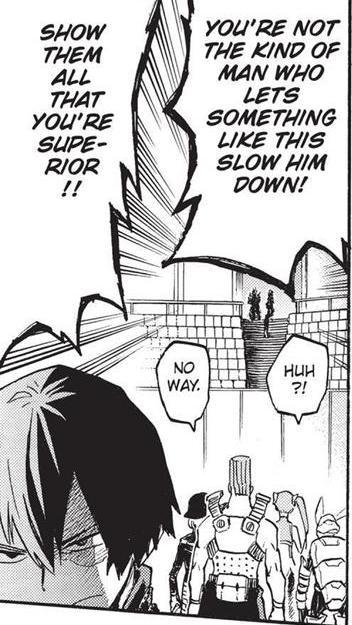
Ch164 – His sour, cross expression when Endeavor embarrasses him.
I had to make some painful choices on which scenes to leave out, but I think five is enough.
I’ve also done these questions for Bakugo, Uraraka, Endeavor, Amajiki, Sir Nighteye, and Shinsou!
#todoroki shouto#shoto todoroki#bnha#nerd mumbling#todoroki#text#ask meme#todoshin#todohawks#kaminari#asui#hagakure#jirou#shinsou#hawks
75 notes
·
View notes
Note
Can we have the tea on why firefly getting cancelled was a good call tho?
My confidence on this website grows in direct proportion to my follower count, and thus the opinions I post get steadily more controversial. I actually got a mostly-positive response to my pro-Twilight post, so [glances around nervously] [dons fake beard] here it is:
IMHO, the producers were right to meddle in Firefly after its pilot, and they were right to cancel it after 12 episodes.
I enjoy Firefly. I’ve rewatched “Safe” and “Out of Gas” over a dozen times, I had a Serenity poster on my wall in college, and I’ve got Mal’s quote about statues as an epigraph in my current NaNoWriMo project. However.
First: they were right to kill the pilot. (And I don’t mean Wash.)
The biggest problem with the first first episode, in a nutshell, is Mal. He’s a potentially intriguing character, but he’s not likable, he’s not competent, and he’s not entertaining. No antihero has to be all three, but every antihero has to be at least one, right off the bat. A couple examples of antiheroes that got whole shows:
Dexter Morgan (Dexter) is a literal serial killer, so definitely not likable, but the pilot showcases that he’s terrifyingly competent with cellophane and also has an entertaining interior monologue.
Greg House (House MD) is questionably competent, and not that likable, but he’s highly entertaining because he immediately makes us laugh.
Jed Bartlett (West Wing) is largely incompetent at social matters, and he’s not funny at first, but he’s immediately charismatic and likable.
Frank Castle (Punisher) isn’t classically entertaining, and he’s not likable, but he’s shown as highly competent from minute one.
Malcolm Reynolds isn’t funny at first. He responds to insults by punching Simon in the face or throwing Jayne out of the room, barely tolerates Zoe’s fond teasing, and doesn’t joke around much. Malcolm Reynolds isn’t likable at first. He acts openly contemptuous toward Book’s and Inara’s chosen professions, seriously considers killing Simon for trying to protect River, loots corpses, and ignores Kaylee. Malcolm Reynolds isn’t competent at first. He fails twice to find a fence for the protein blocks, fails to detect either Simon’s or Dobson’s lies, gets himself and his first mate shot in a bad deal, and barely escapes with his life. He tells Simon that any day where he manages to keep his ship in the air counts as a success.
I don’t want to watch an entire show about this guy after seeing just the pilot, and I sympathize with anyone who feels the same way. The only moment in 120 minutes of screentime that intrigues me is the smash cut between Mal announcing to Simon that Kaylee died and Mal roaring with laughter with the rest of his crew over a prank well-pulled. It’s competent, funny, likable, and enough to make me want to tolerate this guy long enough to see what he’s going to do next. I don’t blame the producers for demanding that we see Simon-pranking guy more, Simon-punching guy less.
The other tone or setting inconsistencies in the pilot — the characters riding horses when they’ve got a faster-than-light ship, the dirt and platinum constructions, the Chinese vendors offering street meat made out of dog, the heroic depiction of the vainglorious Confederate Browncoat cause, the crew all being fluent in Mandarin but not having a single Asian character in the whole cast* — make it hard to get a sense of what the show is meant to be. The different elements just don’t make sense together.
Contrast that with “The Train Job,” the second first episode. There are undeniably Western and sci-fi elements, but they actually make sense together: instead of characters inexplicably swapping land speeders for horses, there’s a spaceship swooping low over a bullet train. Crow uses frontier weaponry, but it’s an intimidation tactic, and he does own a blaster. The Asian-influenced elements make a lot more sense, appearing mostly as background details that hint at a melding of cultures. Mal is warm and affectionate with his crew, willing to joke around to entertain the audience, and at least 43% less misogynistic toward Inara. Niska plays an important role in plot and character, setting up the possibility that we haven’t heard the last of this plot and also acting as a foil to the Serenity crew, who might kill the occasional unarmed prisoner but at least do their best not to poison entire towns.
Is “The Train Job” as unique an episode as “Serenity”? Nope. Does it do a better job at getting someone who’s never heard of this show before to want to tune in next week? I think so.
And then the cancellation.
Obviously, we’ll never know if people would’ve kept on turning in, because the series got less than a single season. And I think that was the right call, from the producers’ point of view. Firefly as a show might not have had the budgetary demands that, say, Game of Thrones did, but even an amateur like me can take one look at that series and go “damn, that looks expensive.”
There are NINE (9!) main characters, with series-regular salaries.
CGI was a lot more expensive and time-consuming in 2002, and literally every episode includes some exterior footage of the ship.
Every single episode involves the characters, or at least the cameras, leaving the ship and going to different phantasmagorical settings.
Even “Out of Gas” and “Objects in Space” had to take the time and money to build the junkyard and Jubal Early’s ship, respectively.
“Trash,” “Serenity,” “Jaynestown,” “The Message,” and “Heart of Gold” each introduces (and requires a build for) an entirely new fake planet.
Every single episode involves minor characters, and over half of them involve crowd scenes that require hundreds of extras.
Horses. And cows. Cost money. As Wash says, shoulda gone with the counterfeit beagles.
The Serenity set itself was built to scale. That’d save money in the long term, but in the short term required more camerawork to actually film in partially-enclosed locations. When you add in the fact that the on-planet shots always required dollies, cranes, and similar equipment, it adds up.
On a similar note, “the Firefly shot” (as it became known) requires days of planning followed by hours of shooting to include all of the characters in one single extremely long camera pan (almost five minutes long, the second time it happens). As a stylistic choice, it was a pricey one.
If Firefly had been spectacularly successful right from the start, it might have been able to justify its enormous budget. The fact that it was modestly successful didn’t justify the amount of money it was sucking from other projects. Over 90% of shows that make it as far as network deals never even get a pilot; over 90% of shows that go so far as shooting a pilot never make it past that first episode. The network decided to spread the love (and the budget) around, rather than sinking it all into a single project currently taking the place of maybe a dozen other potential shows.
Not only that, but Firefly didn’t have a ton of options for cutting its budget down. It could use fewer camera tricks, but that wouldn’t change the need for CGI just to convey the basic premise of the show. It could cut a character or two, but the cast would still be unusually large. It could have fewer on-planet scenes, but there’s only so much one can do with the characters if they’re cooped up inside their ship the whole time. Firefly was also leeching resources away from that team’s two other enormously successful projects – Buffy the Vampire Slayer and Angel — and the low ratings of Buffy’s season 6 and Angel’s late season 3 into season 4 reflect that fact. If it’d been allowed to continue, Firefly ran the risk of killing both those golden geese without ever getting to the point of producing eggs itself.
Do I wish there was more of the show out there? Yes. Do I wish the show had had time to evolve, hopefully into something with fewer problems of casual racism? Hell yes. Would I have pulled the plug as well, if I’d been in the room when it happened? Probably yes.
*I am aware of the theory that, given the heavily Asian-influenced settings in the “Safe” flashbacks, the popularity of “Tam” as a Chinese last name, the choice of dark-haired light-skinned actors, and specific elements of the family’s pressure to excel but conform, that the Tams are meant to be Chinese. Given that all four actors are white, and that there are already ample problems with anti-Chinese racism in this show, I strongly prefer not to ascribe to that theory.
#firefly#serenity#nothing to do with animorphs#firefly negativity#serenity negativity#joss whedon#whedon negativity#long post#anonymous#asks
98 notes
·
View notes